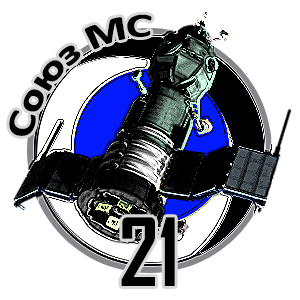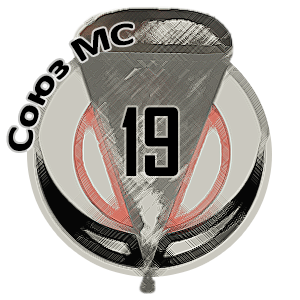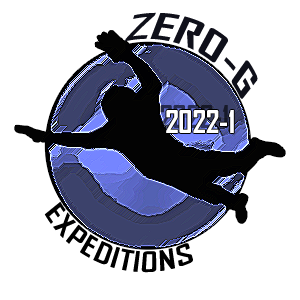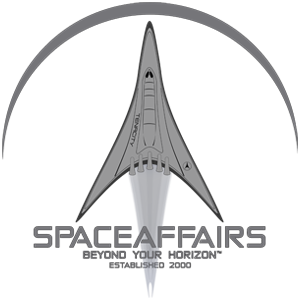
Commanders Sea Survival
A Cosmonauts Survival Diary
by Andreas P. Bergweiler (D) September 2001
A "Cosmonauts Survival Diary" or "Per aspera ad astra"
From the Captain’s LogThe day before - 11.09.2001
The day begins peacefully as always. After I've cleared up the rest of the things concerning my trip to Russia and can call dollars and traveller's cheques my own, I must cut my hair. I think, when I look at my reflection, that it is better to go to Russia with short hair because I have heard that the Sokol space suit is not comfortable to put on.
I stand in the bathroom and cut my skull with a hair shaver when I hear that my friend Astrid is coming home and falling into the living room.
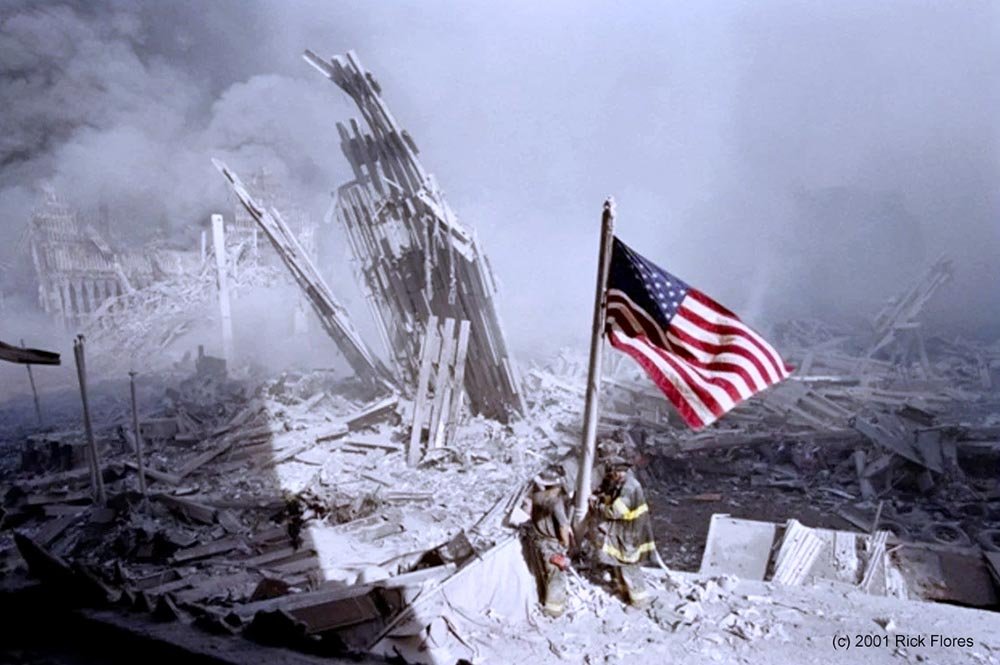 Ground Zero - September 11, 2001
Ground Zero - September 11, 2001My first thought is: Funny, she turns on the TV, the US Open has been over since Monday. I ask and hear that a plane has flown into the World Trade Center... I immediately stop cutting my hair and fall into the living room and see the disaster, and my mission threatens to fail.
I cry when I see the people.
I scream as I see the second plane crash into the other tower, and I realise: This is no coincidence. It can't be. The terrorist attacks in the USA make me desperate, make my long-prepared mission seem like a joke. I have anger, fear. I think that it cannot be. And you will fly to Russia tomorrow?
I can't. Impossible.
In the afternoon three hours of consultation with my companion Michael Schultz and Walter Drasl from PRO TOURA. We think about it. We discuss. Everyone is shocked. In the end, they leave it to me to fly or not. What good will it do us if Michael and I don't fly?
The earth will continue to rotate, and we think into the future. It would be fatal to embitter a chance of life now. So, I say after three hours: Okay. I will fly and hope only with me that I can return to a rational world.
In 11,000 meters breakfast above the clouds - 12.09.2001
04:45 o'clock
The day starts early for me because I am picked up shortly before 6 o'clock. Man, what do my bones hurt; the last 3 months were filled with work, sometimes 16 hours a day, and that every day. My 36-year-old body speaks to me and tells me: "Boy, you're not trained enough for this trip. But my mind tells me: You grow with your tasks!“
After the "pick-me-up shower" quickly strawberry milk, quickly everything checked again according to the motto "Do I have everything too?", smoking a cigarette with Astrid and then goodbye. Because of the events the day before I think: Will I see everyone healthy again when I come back? Will I come back? Will I return? In any case, the time in which we will live from now on will be different. I try to concentrate my thoughts on what is coming, it will be more than challenging enough for me.
I say "Bye, Waldesch". Oh no, that is now called "Dosbedanja Waldesch".
07.00 o'clock
After a fast ride in the pouring rain, I am now at Frankfurt Airport. Despite the politically changed world situation, it is hushed. No hustle and bustle, no palaver with security officers. TV teams have positioned their cameras, but it is still too early.
I quickly smoke a cigarette in front of the airport building and call home again. All right in FFM, my flight will leave on time.
Then quickly checked in, another one smoked. Fucking cigarettes, sometimes I could throw them somewhere else.
I make myself on the way to the gate B50, where the aeroplane LH 3550 goes to Moscow - a Boeing 737-500 - punctually, as it is called. In the gate then a surprise, which is then after exact thinking nevertheless no more after all. Dead silence is in the gate. I think I landed wrong, but I am right. My flight is on the terminal screen. After a while, I notice that many passengers have cancelled their trip. We are only about 60 passengers. That I will now have more space is clear to me, just the reason is not the most beautiful.
Until everything is boarded and checked, and we take off towards the east, it is 8.35 o'clock. I am on my way to a nation that has written significant space history. Even though I am not a professional, I think of the many men and women who have already been in space. They too have flown from somewhere to somewhere, and I am on such a journey now.
I will not really wake up until after an hour of flying. I sit far back in the penultimate row and can follow what is going on in the galley. The smell of coffee in my nose makes me more awake, and it means first: Breakfast at 11,000 meters altitude, as the Captain told me before. While I am having breakfast, the thought comes to me to write this diary. Why shouldn't I?
I try to banish the horror pictures of the day before from my thoughts. That's not easy, but it must work. At some point, I will make it and doze a little bit...
14.15 o'clock local time - Moscow
The approach on the airfield Sheremetyevo is a little bumpy before, but the captain puts on the Boeing 737 butter softly. The earth has me again!
Now I think that the stress goes on with the entry formalities, but I believe! After 5 minutes I have been examined in Moscow by a gloomy looking customs officer and get my passport back. "Have fun in Russia" she calls after me in German. Then I smell Moscow air for the first time. Somehow everything feels like waste oil, I think. There will be a reason for that.
I walk along a long corridor and watch the people overtaking the people passing me or I pass them. Everything seems to be normal here too. I notice a sign held up by a man. "Andreas Bergweiler" is written on it, I don't believe it and think: "Andreas, you're in Moscow!"
A friendly face smile at me. The greeting is warm, his name is Igor, the rest I forgot at that time. He is the contact man for Astrium in Bremen, somehow, I've heard his name a hundred times before, but I didn't think of him picking me up personally. He says: "It's the first time for GCTC to have a civilian participant at this training, so, will stay with you for this trip, not behind my desk!“ I laugh at him; something tells me that this meeting will mean something special. Igor immediately begins a relaxed conversation, I immediately feel comfortable. While we wait for my "media consultant" Michael Schultz, we smoke a cigarette.
I quickly lose my mother tongue and babble in English.
20 minutes later I see Michael Schultz, he hasn't seen us yet. "Hello," I say and wave my hand, then he also notices that he is in Russia - Moscow. He says to me "I am Michael" and gives me his hand. That his name is Michael, I now know enough, but that is another story...
We exchange money afterwards and stand in front of an exchange office. The girl behind the glass looks very cool, and it takes over half an hour until I have received a bundle of roubles for my 200 US dollars. Just over 5,000 roubles. After this procedure is over and we step out of the airport building after miles of walking, Igor says: "At this season here in Moscow it is raining. But not today!" I laugh and say to him in English: "Sure, I'm here too!" He laughs out loud, and we go on. Outside its about 26 degrees, and the sun is burning from the sky.
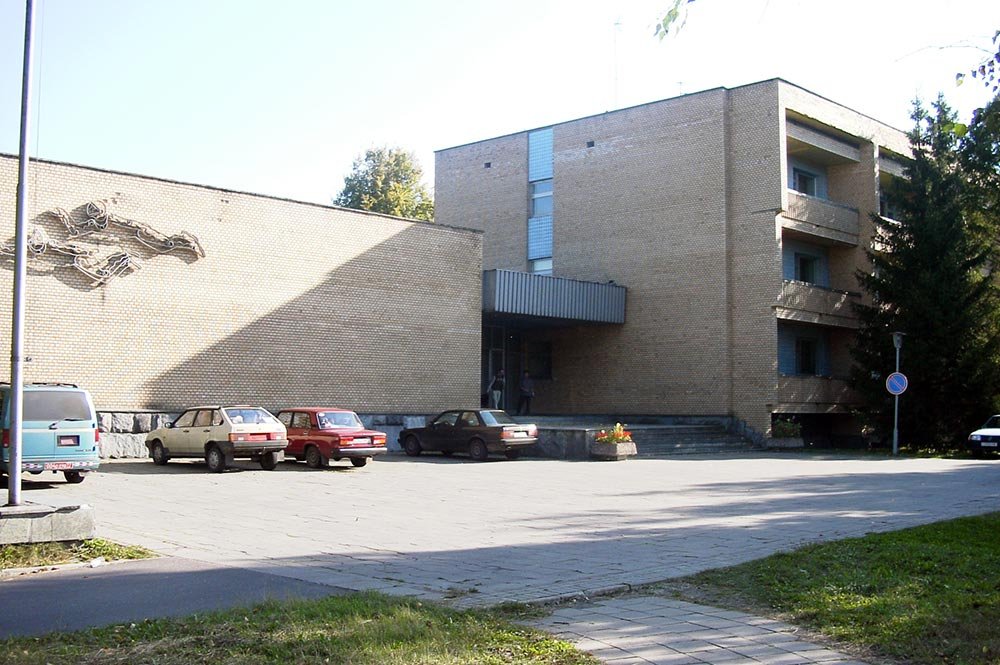 The Cosmonauts Hotel - Star City - September 2001
The Cosmonauts Hotel - Star City - September 2001Then finally we are in the parking lot. We are received by a private of the Russian army. He doesn't say a word, but I can read his thoughts somehow. After entering the not so fresh-looking car, we start our journey to the world-famous Star City, the space metropolis of Russia. For the trip there, one apparently needs a survival course. The roads are congested, but somehow the Russians know how to get to the front by just looking for the narrowest and best way!
And what a ride we do! Russians drive different cars in any case. Just like their cars look, they also drive! We babble in the car without any meaning, and Igor explains a lot to us. I quickly realise: they are professionals, and I have my first thoughts in my head: Andreas, what are you doing here?
After a little over an hour's drive, I see a sign for the first time that I had only seen on television or in the movies before, the famous wrought-iron Star City sign. Now we turn and continue an asphalted road. After another drive through wooded areas, we quickly arrived at the main gate and directly drive through, without control.
The ride ends at the Star City Hotel, and we get off. It is pleasantly warm, and I get warmer and warmer at the thought of who will have slept here in this hotel. Krikalov, Usachev and what they are all named. Russian cosmonauts are not as well known in the West as American astronauts, but meanwhile, you can stop counting, which doesn't stop the performance of these men or women.
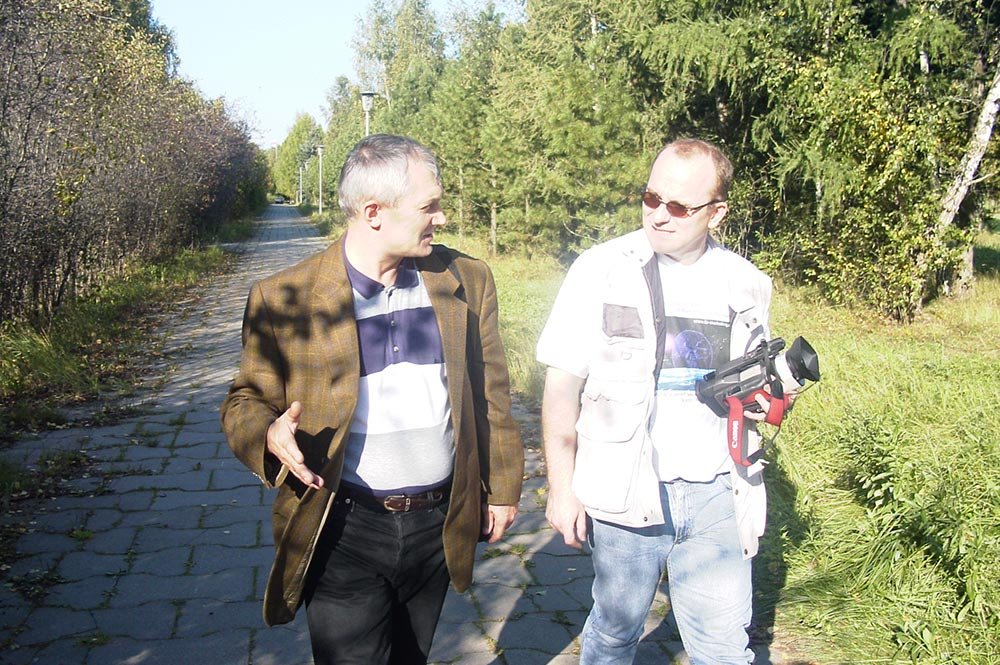 Igor Rudyaev and Andreas P. Bergweiler - Star City - September 2001
Igor Rudyaev and Andreas P. Bergweiler - Star City - September 2001After checking in at the information desk, where a small woman is sitting, I am assigned room 14 on the ground floor, Michael is assigned room 12.
"Where is the 13?" I ask and learn: In Russian space travel there are no 13.
Aha, I think, why not. Superstition has not harmed anyone yet. I enter my room. Who might have slept here in the last 25 years? Maybe a few German astronauts like Thomas Reiter, Merbold or Flade?
Igor wants to pick us up again at 18.00 o'clock. Hmm. No guided tour through Star City? But he is back half an hour later. "Okay, we have one and a half hour!
The sun is burning from the sky this afternoon as we approach the first halls hiding behind a guard through which we merely pass. This open attitude would have been unthinkable 10 years ago, I think to myself - times have changed fundamentally. I look at the surroundings and feel of the books and websites I have read about Star City in recent years.
It is as described: High-tech in an environment that doesn't quite fit. But even my grandfather once said to me, when I was still a little rascal: "You shouldn't underestimate the Russians. Above all, they have a practical disposition and build a tank chain out of a bicycle, if necessary!”
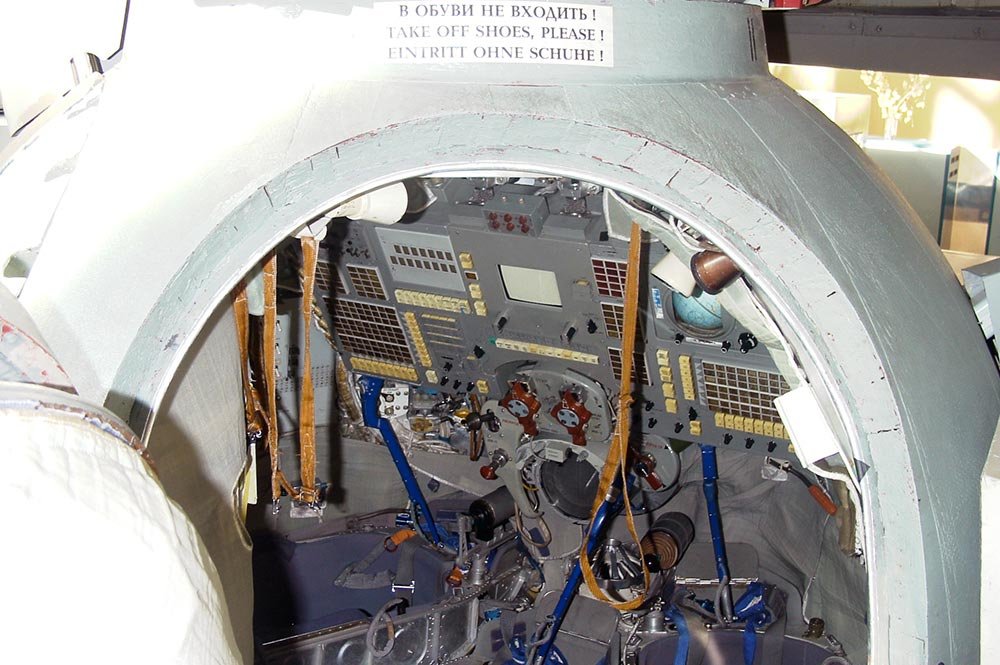 Soyuz TM Simulator - Star City - September 2001
Soyuz TM Simulator - Star City - September 2001After another 5 minutes’ walk, we are standing in a giant hall: The Soyuz Simulator Complex. Igor proves to be an absolute expert; I notice that he not only works for space travel but also lives with space travel. He explains everything down to the smallest detail, and I feel kind of funny. I would never have thought of being able to stand here for once.
During the conversation at a Soyuz-TM, I get suspicious when Igor tells me: "You sit in such a capsule for at least 4 hours on Sunday. Packed in a Sokol spacesuit and strapped down." 4 hours at least! My head says to me: Thank you, Andreas, for wanting to do this to me!
I ask. "Sure," Igor says, "that's the final training in which it's important to show whether you have what it takes to get out of this capsule when the salvage ship arrives. And that can take a maximum of 36 hours." I'm just getting sick: Of course, I've heard about it and can imagine all this, but I didn't know yet that I would be sitting in a Soyuz capsule for such a long time under these conditions!
He explains to me that you then must change into this capsule: Out of the Sokol and finally into the survival suit "Forel" (trout, ha!). Uff, I didn't know that until now. Yes, my goodness, I think. Will I be able to do that?
And then he tells me: "You are the first civilian who will do this training!"
I'm just a little short of words. I had been told that before, but somehow, I couldn't get it into my skull. Yes, am I Neil Armstrong or Alexei Leonov?
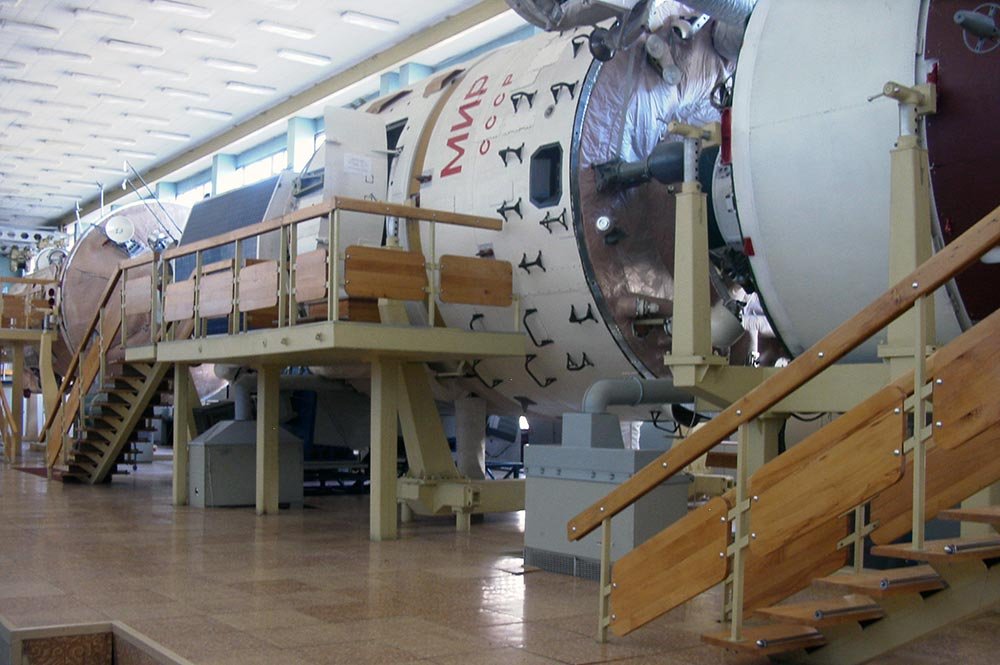 MIR Space Station Simulator - Star City - September 2001
MIR Space Station Simulator - Star City - September 2001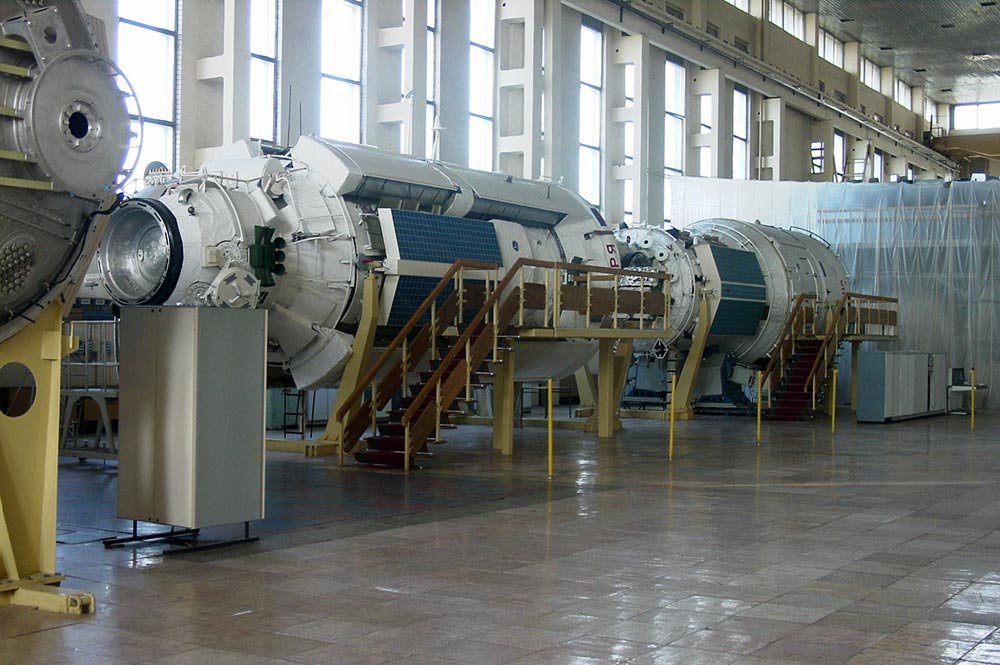 Russian ISS Segments - Star City - September 2001
Russian ISS Segments - Star City - September 2001After a short minute of shock, Igor leads us for miles through the cosmonaut centre. Suddenly, and we're standing in front of the MIR simulator!
God, this thing is big. To see Kvant, Spektr, Pridora module in original size in front of me, I would never have guessed. The MIR was huge, 140 tons live weight. Up a short staircase and I enter the MIR, I quickly recognise the interior. Half an hour of talking shop with Igor follows; he is surprised that I am somehow familiar with the module names and facilities. Well, I explain to him, the last few years I have been intensively involved with the topic and have developed into a wandering space lexicon.
Then on to the Russian ISS modules!
Just as big and silvery shiny, but MIR-like. Russian technology - without it the ISS would not be possible. This can be seen in such a place; it becomes suddenly apparent to every visitor interested in technology and space travel when he stands in front of it and can touch it.
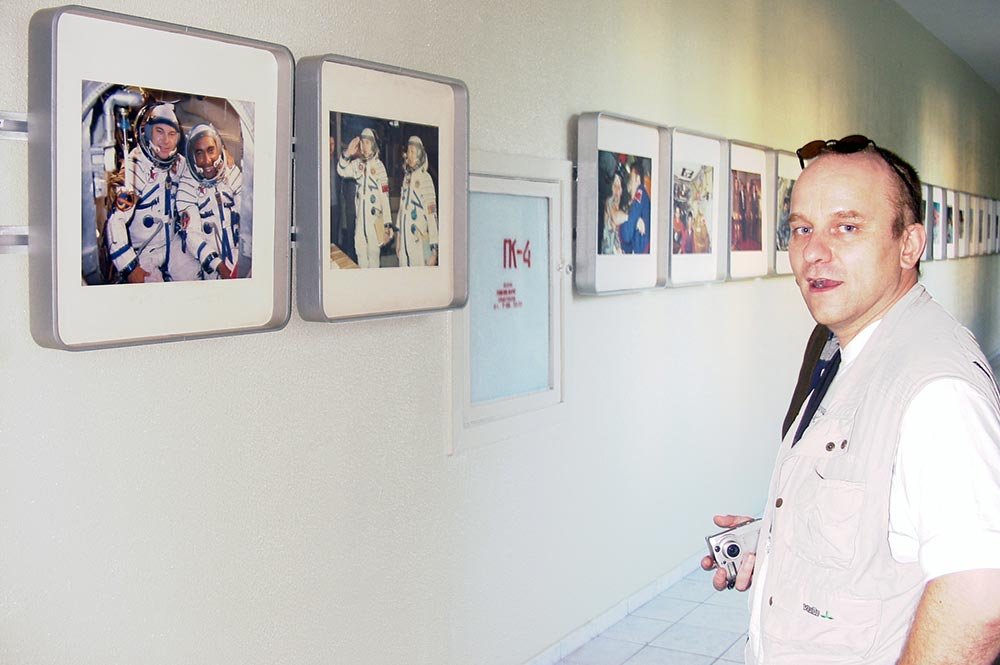 Walk of Fame - Star City - September 2001
Walk of Fame - Star City - September 2001We continue to walk through the corridors. Hundreds of pictures of different crews from Russian space history hang on the wall. I recognise some: Leonov, Volkov, Krikalov, to name but a few. Damn, I think some other faces look familiar, but I can't think of all the names at this moment.
Time is pressing, quickly still to the centrifuge and to the deep diving pool.
The centrifuge is incredibly significant. We are standing in a room that is at least 50 or 60 meters wide and 20 meters high. A Swedish company built the centrifuge, explains Igor. It is unimaginably vast, and my stomach becomes somehow dull when I imagine going on a journey with this steel colossus.
The water basin of the hydrolab is not as big as the one in Houston at NASA's Johnson Space Center, but somehow more impressive. The complete working platform can be lowered; now the FRGB supply module with the airlock is standing on it. It is tough for me to get the dimensions of these modules into my head. Impressions without end; I almost forget to take pictures of these impressive things, but only almost!
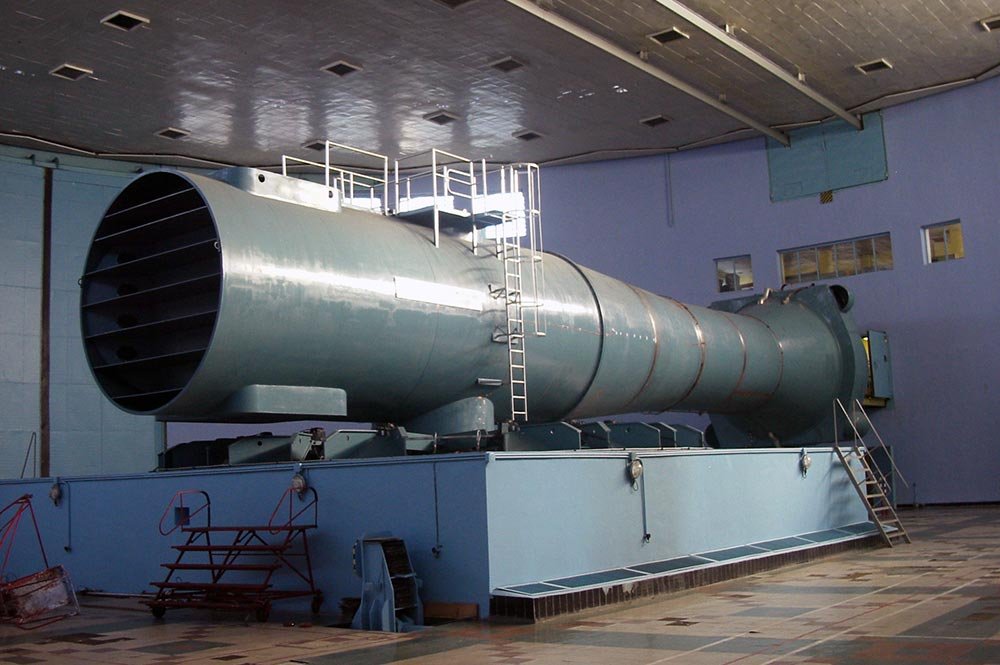 TFS-18 Centrifuge - Star City - September 2001
TFS-18 Centrifuge - Star City - September 2001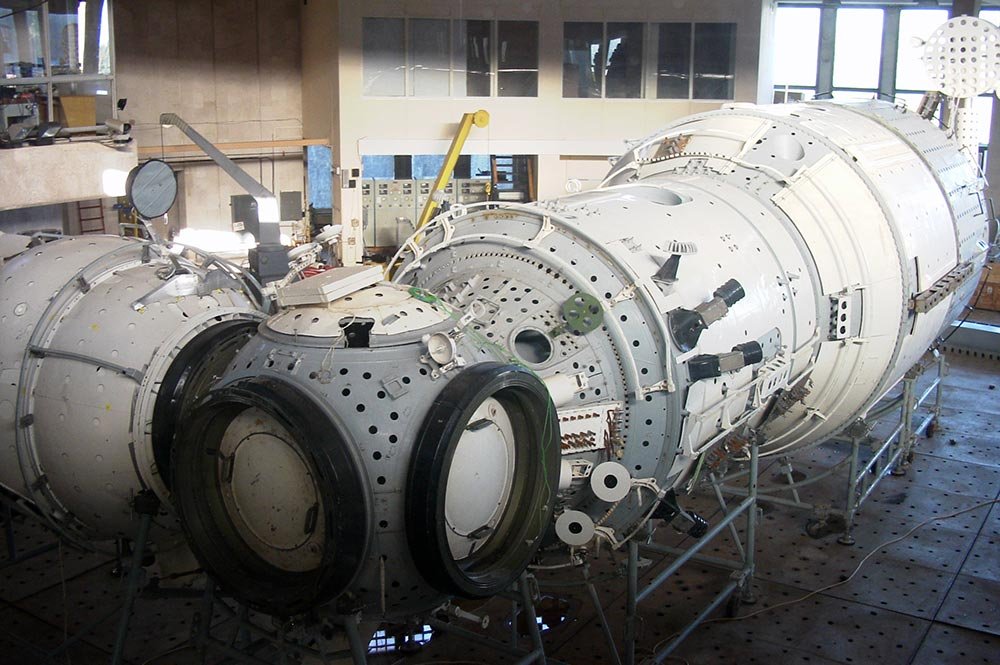 Hydrolab - Star City - September 2001
Hydrolab - Star City - September 2001At shortly after 18.00 the guided tour through what you can see in one and a half hours is over. Igor takes us to a restaurant where we are the only guests. Hearty people, I notice that also here very clearly. Igor leaves us after he has led us to a richly laid the table, and Michael and I talk shop for another two hours.
Then the tiredness of the day becomes noticeable, and at half-past eight we walk towards the Star City Hotel, but this time another way, around a lake. Somehow it doesn't occur to me that I'm here in Star City. Everything here is different than you can imagine.
Tomorrow morning it should go very early in the direction of Sochi. With an Ilyushin 86. And then it will get serious, I think to myself. What is funny is that I have no doubts whatsoever about what awaits me; even the premonition of spending 4 hours locked up in a capsule does not really frighten me.
But we'll see when it starts.
Now it is just after half past nine, and I sit at my spartan table and write the first words in the diary of the cosmonaut Bergweiler. Then I will smoke a cigarette on the balcony. Maybe you can see the stars? The light here has power fluctuations, and the right-hand start to hurt. As a computer user, you are entirely not used to writing so much with your hand anymore. Tomorrow evening I will probably be still broken than today, and so it will be perhaps in the next day’s more often, but: what the hell!
After all, I'm not here for a relaxing holiday!
From Star City to Sochi - 13.09.2001
It's 4:30 in the morning again. My mobile phone rings, the lady of the hotel Star City didn't wake us of course. But I still have time, pack up and go to the reception and have a chat with the lady from the hotel. It's very dark outside, which I notice through the windows. I learn that the hotel has existed since 1975 and is much too small for today's conditions. The Americans rented a whole floor for their Apollo-Soyuz program it was once again evident.
The door opens, and a man comes in. Damn, I think that's nobody else than Mark Shuttleworth! "Hello, Mr Shuttleworth." I greet him, he stops, looks at me questioningly, but smiles nicely and answers "Do we know each other?” I say no, tell him where I know his face from and when he finds out what I'm going to do he says, "Well, I am coming directly from the Sea Survival Training. We had bad weather conditions all the time with high waves, so a part of the training I must do in the Hydrolab here. Be prepared, it will be very hard!". He says, gives me another hand because he's in a hurry and disappears. My brain is already swimming in thundering waves, thank you, Mark!
At 5.20 o'clock we are picked up by a battered Opel Omega and brought to a collection point. The driver is a grumpy looking Russian who hardly gets his teeth apart, only very hesitantly he gets a smile in his face. At the meeting point, I meet other crew members for the first time. Igor is also back, and he tells me that my Commander will be Sergei Volkov, the son of the famous Russian cosmonaut Alexander Volkov, colourful troop gathers around me and examines me. Altogether we are 6 candidates. An American doctor is also present, and I think that he is an astronaut. Rick is his name, and he squeezes me out from the moment we sit in the van. When he finds out that he has forgotten his passport, we return to the hotel. Funny, Michael and I could have saved the trip. After Rick has his passport, we drive in the direction of Moscow Sheremetyevo 1, to the national airport of Moscow.
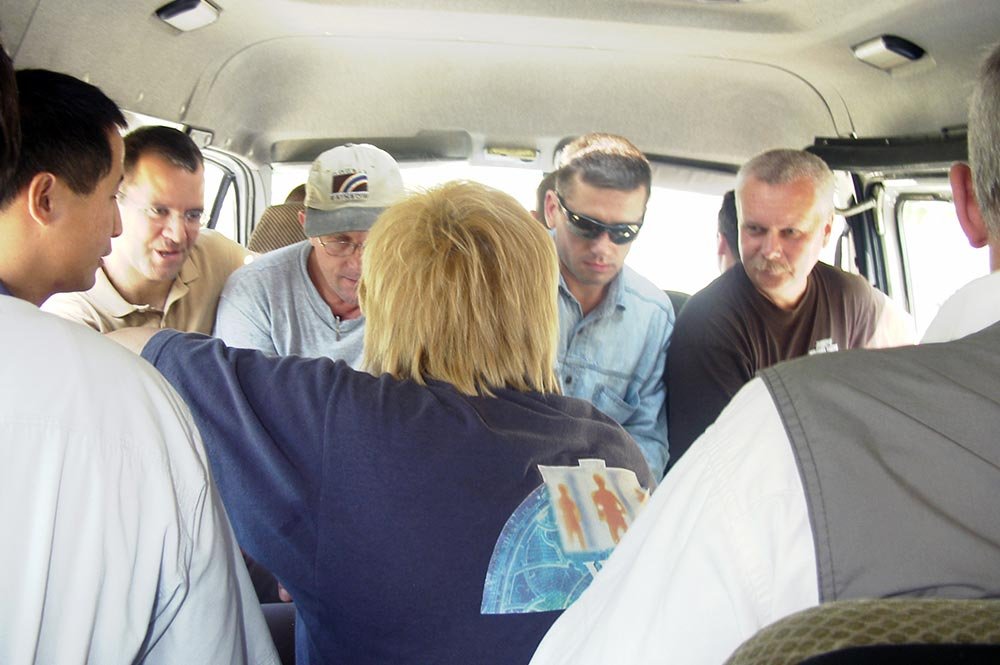 With the van to Kudepsta - Ed, Paul, Rick, Irina, Yuri, Valeri - Sochi - September 2001
With the van to Kudepsta - Ed, Paul, Rick, Irina, Yuri, Valeri - Sochi - September 2001The guys in the van are chatty, but also tired. I have trouble remembering the names and assigning faces to the names. When we arrive at the airport, it is already bright.
And then: Nothing there with military transporter. We fly with the Aeroflot to Sochi!
I remember the website "Disasters in Air Flight", where Aeroflot leads the list of crashed planes as well as the dead and injured!
After one and a half hours of waiting and a cigarette break with Igor, we go to the huge Ilyushin 86. After a while, we are in the air, and I can only wonder: The Airbus A 340 is called a "whispering giant", but this plane is more spacious, more comfortable and much, much quieter during the flight. Well - I tell myself, not all that glitters are gold!
During the two-and-a-half-hour flight I talk to an American astronaut sitting on the opposite side of the aisle. His name is Paul Richards, and he was with the STS-102 mission in space on the ISS in March of this year!
Also, my seat neighbour is chatty after sleeping an hour or so. His name is Edward (Ed) Lou. From the outside, I would have thought him more like a Russian, but so you can be entirely wrong. He was already twice in space, once with the mission STS-84 Atlantis from May 15 to 27, 1997, which docked to the MIR, and once with STS-106 Atlantis from September 8 to 20, 2000, where he and other astronauts prepared the ISS for the first ISS-1 crew. He spent more than 6 hours in space at EVA´s and is now in training for the ISS crew 7.
After two hours of flight, we arrive at the Adler-Airport in Sochi. It smells of oil and salt, the temperature is pleasant, about 32 degrees. But a wind blows, and so the stay and first impression become even better. I get the smell of oil no longer from my nose since I am in Russia. Only in Star City, it did not smell like that.
A short introduction at the airfield: Igor introduces me to Valeri, the leader of the training! Oh my God I think and think of my training skewer. White hair combed up, a white moustache, steel blue eyes (which also look warm) and a T-shirt with the imprint "Watch the bulldog - SFOR". That can be cheerful, a real "bullhead", I think. He greets me friendly, but with an authoritarian restraint. He quickly makes it clear to me by his behaviour which the master seems to be here in the ring. He has undoubtedly already taken me into his heart, I think, but one should always wait and see what people are like before forming a judgement.
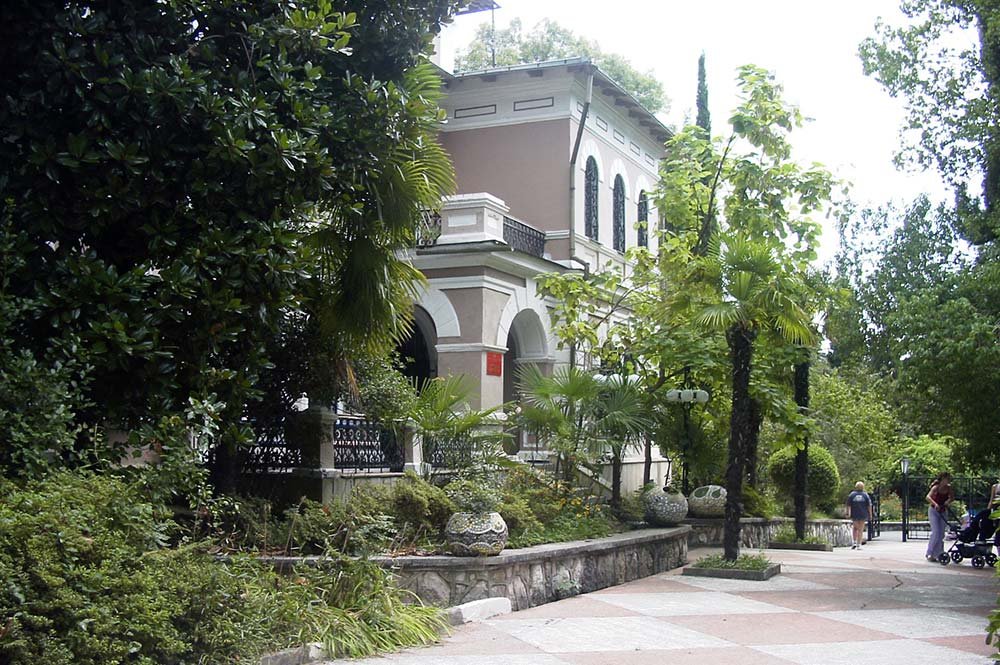 Kudepsta Trainings Camp - Sochi - September 2001
Kudepsta Trainings Camp - Sochi - September 2001After the short greeting, the team drives with a van to the "Kudepsta Training Camp". A beautifully situated oasis with lots of bushes and trees, but I also see the hotel wings, which don't give the impression that they will be very comfortable. But what do I expect? After all, I am not here to go on holiday, but to participate in a Sea Survival training. We drive up an eternally long ascent in the van, and I think about whether the engine of the truck will be able to do this. Sometimes it is just about to die. I remember Igor's words: Climbing the stairs in Kudepsta alone is enough fitness training!
Valeri gives a short speech; a little Russian woman, Irina is her name, she smokes in a chain, translates his Russian into English. We get our room assignment, and I learn that my roommate will be Ed Lou. The afternoon until 2 p.m. would be free for dinner. Then the first theoretical lesson of the survival training; for me, a single session will be held later in the evening to get to know the survival kit "Granat 6". Extra for me, I'm not surprised at all!
Now the first funny thoughts come to my mind, which are different from the ones I had before: This trip will bring me to the edge of my physical and mental performance.
Well, lunch will be at 14.00, then the first theoretical hours will start. Will I get the jumpsuit I was told about? So far there has been absolutely nothing to see of overalls. Well, until this evening I will probably know a little more again, I think, go to my room, shower briefly and try to kill time until 14.00 o'clock. I call home and tell them that I am now in Kudepsta-Sochi. My heart is beating a little faster this afternoon, but who should be seriously surprised? 16.00 o'clock
The first lesson begins. Usually, it should start at 15:00, but those responsible have a date with the NASA boys. Something tells me this might have something to do with me. The first two hours go by like in flight. Russian speaking trainers tell in brief sessions what is necessary for the early minutes to survive after a landing in the water. They briefly mention the different survival techniques and what is especially important. Some of the terms are already familiar to me from the German Armed Forces, but of course, I have never heard these terms before in cosmonaut training.
The first three minutes after the impact serve the evaluation of the given situation. Depending on the condition (and that can be very many conditions) the cosmonaut in the team must decide what to do. It is always important to stay in the capsule for as long as possible. Of course, this only applies if the "Descent Capsule" is in order. In case of fire or water, the capsule must be left as soon as possible. If you have enough time, you must change into the survival suit "Forel", which allows you to survive in 0-degree cold water for 36 hours.
These survival techniques and devices allow the cosmonaut to survive for three days. On the first day, for example, nothing should be eaten from the emergency rations. The water supply should be divided between the first and third day as follows: 1st day: 20%, 2nd day: 40%, 3rd day: 40%.
You should also look out for land. How do you do that?
a) Bird watching: The high-flying birds, as they fly back from the sea to the land after foraging. The low flying birds fly crosswise because they are looking for food.
b) Cloud formations: Cumulus clouds. These are the high towering clouds (everyone has seen them before), which basically only form over land when humid air from the sea combines with dry air from the ground. Where cumulus clouds are, there is land. Of course, these clouds can be miles high and the land dozens, if not hundreds, of miles away.
c) Horizon: If a ship or an aeroplane appears and you are sure that you are seen, you use the signal pistol. The flare flies 250 meters high and burns for one minute. Then you have two smaller signal cartridges that fly 100 meters high and burn for 10 seconds each.
And what's important is, if you're found, let the emergency services grant it: These are professionals who know what they are doing!
The medical aspects of the training are addressed by a doctor. Heart activity, blood pressure and pulse are also monitored during exercise.
Good Lord! Something will come out with me!
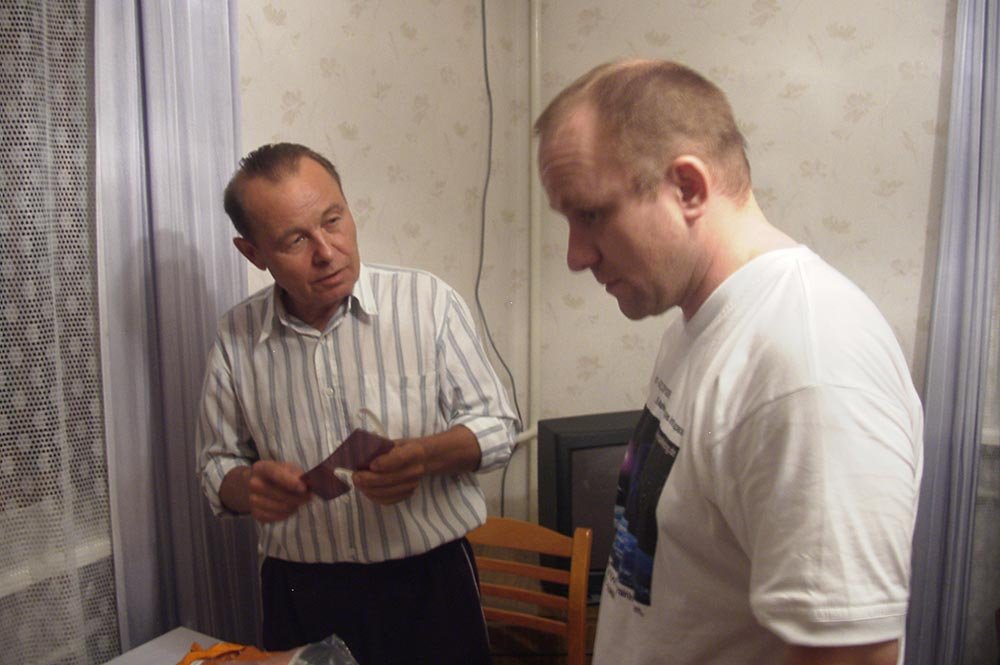 Dry training with the Granat-6 Survival Kit - Sochi - September 2001
Dry training with the Granat-6 Survival Kit - Sochi - September 2001At 19.00 o'clock I shall be introduced to the secrets of the Granat 6 Survival-Kit. The other astro- and cosmonauts already know him well enough, I don't! So, there is a secret hidden in this green suitcase. My roommate Ed Lou, when he sees the bag, says: "You are wondering about that thing. Such a little box with so many items!“
I say this is like Christmas and he laughs.
They also tell me that I should sleep a lot and drink little alcohol for the next few days. Well, I'm not so fond of alcohol anyway, and the last weeks before my trip to Russia were "hell" on business, so the tip comes in handy. Then I will have a short nap before dinner.
At dinner, I sit down at Sergey Volkov's table. Also, the Americans and Rick the doctor sit with me. Paul, Rick, Sergey, Ed and Juri chat in a confusion of Russian and English. Apart from a few polite phrases, they speak little to me. I can also contribute very little in terms of flying experience with a MIG 29, MIG 25 and a T-38!
After dinner, I go back to my "suite" and get a visit from an instructor who now wants to explain the secrets of the Granat 6 survival kit. The chain-smoking straw-blonde Russian Irina is in tow as an interpreter. The instructor is an older man who looks as if he just got up. First, he explains the different contents to me in Russian:
- pack: water unit with 6 litres of water
- pack: Food, medication, matches (of course windproof), sewing kit, wire saw, dry alcohol, first aid kit, sunglasses and unbelievably many other things (Ed was indeed right about his saying this afternoon).
- pack: The commander's bag with the pistol, light signals, torch, radio, etc.
I get a crash course in an hour and a half and use the different things as the instructor shows. He is cute and laughs a lot. I notice that the Russians are friendly people and not superficial.
Irina translates into English, partly verbatim. It really comes across that my instructor is serious about it and still gives the lecture adorably. Michael takes pictures during the lesson, which show me in all kinds of poses, for one of our sponsors "Photo Dose". For all I care. After one and a half hours I understood a lot and at least know what is inside wherein the three packs.
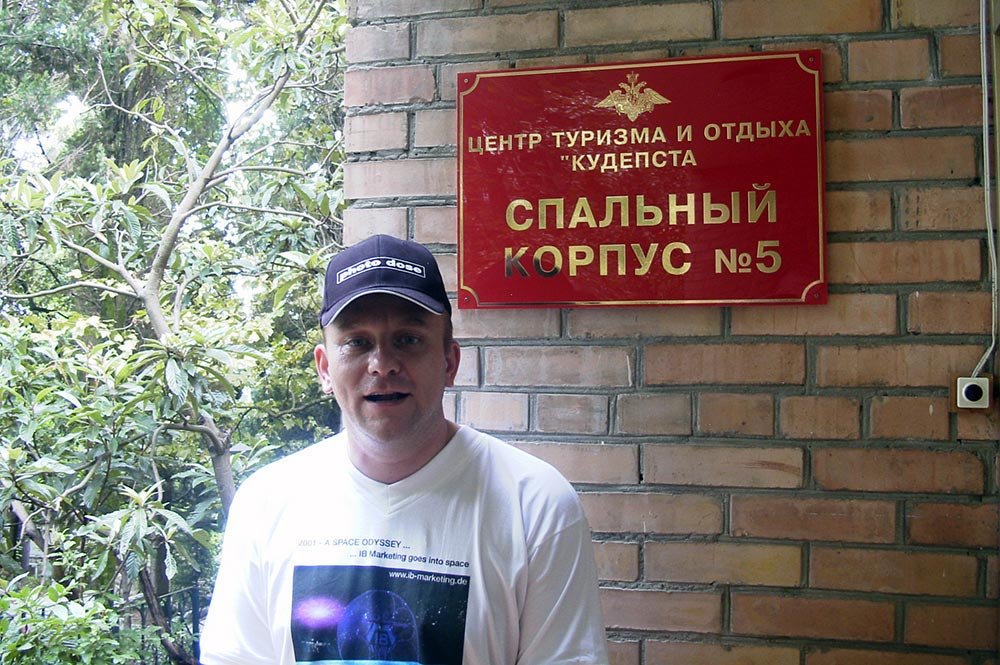 Welcome in Kudepsta - Sochi - September 2001
Welcome in Kudepsta - Sochi - September 2001After that, I have a small talk with Michael. It seems as if NASA had exerted real pressure on the Russians this afternoon. It seems to happen below the executive floor of NASA administrator Daniel Goldin. NASA says: It can't be that Mr B. from W. disturbs the training of the professionals; he's not a professional (by the way I don't want to be a professional either). Now Igor has arranged it so that I will take my final test on Monday only with Sergey Volkov, not the extended training! When I hear that, I breathe a sigh of relief. I've already heard too much about what goes through your head in the capsule.
But there is still a long way to go. 3 days on board the ship, which I get to see tomorrow. I can't tell if I'm afraid or not; I just let it come to me, quite simply. What else can I do?
Later in the evening I sit in our room on the balcony and think that tomorrow I will get myself a fat sunburn. I hope they've taken some precautions because I forgot my sun cream at home in Germany. Typically, you always forget something when you travel.
You also need a survival course in our bathroom: The floor tiles are splintered, and I say to Ed: "Watch your step! You'll need a survival course in our bathroom!"
Very well. Tomorrow evening I'll probably be as flat as a flounder and have at least burned my ass correctly. It won't be easy.
It starts to rain. A wave with the fence post, for me or against me? I see lightning in the north. Only I think that's normal for the area here. I guess I won't get much to see from Sochi. When I'm about to hit the wall, Ed comes. He also gives me a few tips for handling the space capsule and working in a space suit: "Slow movements, see before where everything is! - Slower, in this case, is faster". I will remember the words and take them to heart.
Changing diapers in the Descent Capsule - 14.09.2001
The breakfast starts - like every morning the next time - at 8.00 o'clock. In the morning I sit together with Michael and Igor at a table, and we talk trivial stuff. My thoughts are already on the Black Sea, and I am curious about what I will experience the next days.
Afterwards, the whole crew meets at a central meeting point, which looks like a playground. Some colourful animals are imitated from stone or wood and stand on a square.
Valeri gives a short introductory speech to the crew. I learn that the crew consists of the original Star City rescue team; everyone will be in action within the next few days. Then we walk towards an old bus and drive to Sochi to the harbour. The waves would be too high this morning to take the ship's escort boat to the ship! Well, that can be cheerful. The vessel is now lying in the harbour waiting for us.
After we went on board and shook the hand of the captain and his officers, I see the Descent capsule for the first time. In its orange-red colour, it is also not to be overlooked! I don't have much time, I am assigned a cabin that is still being cleaned. On the wall hangs a photo of Lenin. The unique thing about the picture is that no matter where you move in the room, Lenin always stares at you. What might he think about me when he sees me like this?
I wait in my cabin with Michael for the events of the day. Then Igor comes and says: "Let's go" and leads me to the aft deck of the ship.
I meet Sascha, my instructor for this day. He is at first a grim looking guy, and I know him from yesterday when he explained to us in a short lesson what is essential in the first minutes after watering.
He doesn't leave me much time to think and shows me the different things that are accommodated in the Survival Kit Granat 6. Some I recognise from the lessons in my room yesterday evening, others I see for the first time.
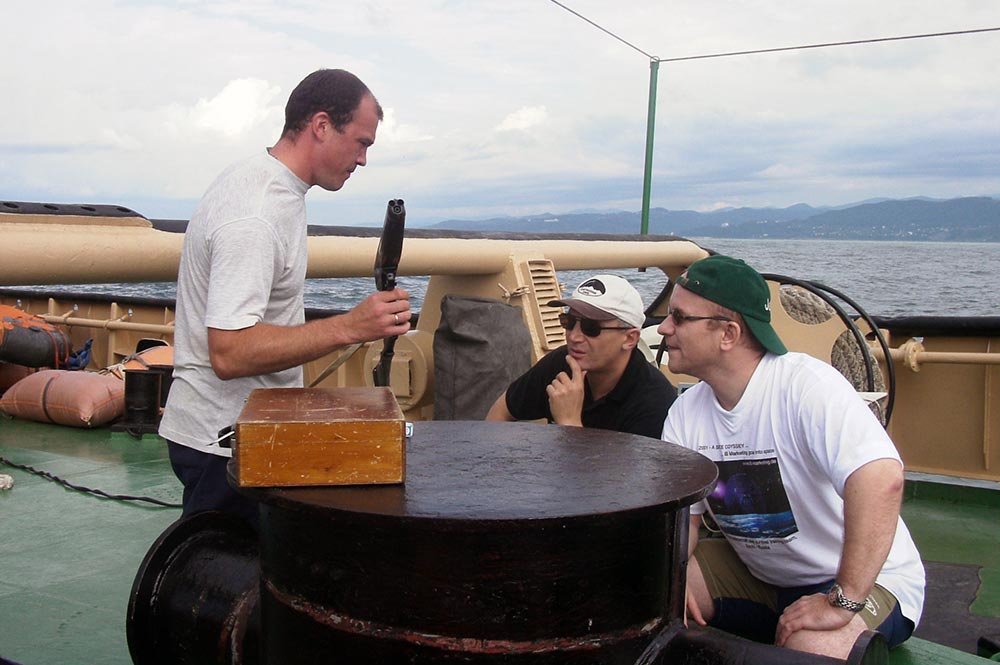 Instructions with the gun of the survival kit - SB36 - September 2001
Instructions with the gun of the survival kit - SB36 - September 2001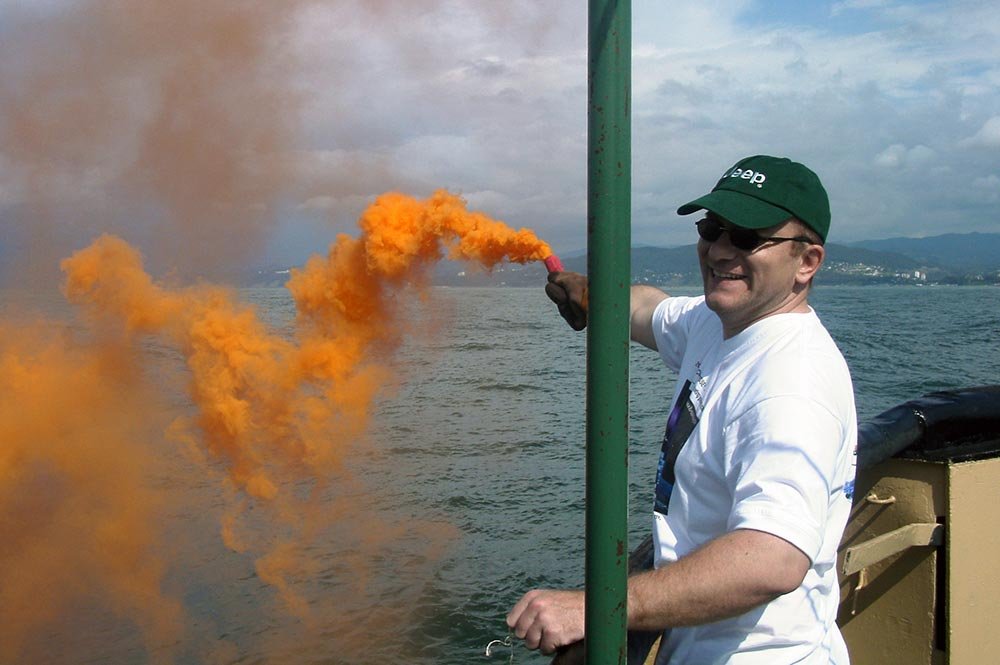 With the daylight signal - SB36 - September 2001
With the daylight signal - SB36 - September 2001I spend the next hour shooting at plastic cola bottles with my pistol and trying out the ammunition. The day starts off well, I think. Everything happens very quickly, and I get the most diverse activities explained in the smallest detail. Sascha turns out to be a patient instructor. All this is just too new for me, and I must ask a lot of questions.
After two hours on the deck of the ship Igor tells me if I wouldn't even like to talk to the psychologist. Sure, I'll make it smooth, I think. Why shouldn't I?
In my cabin, I meet an older man who immediately greets me like an old friend. I notice immediately that he must be the psychologist, even if he doesn't look like one. But somehow, I know. His name is Rostislav, I learn after a while, and he has been in the Russian space program for over 30 years. He looked after almost all the crews that were in space at that time and was also on hand to advise and assist the team in emergencies on the MIR (fire in 1997 and collision catastrophe with a Progress cargo ship in 1999). Igor acts as translator. Igor becomes a true friend for me these days, I notice this more and more.
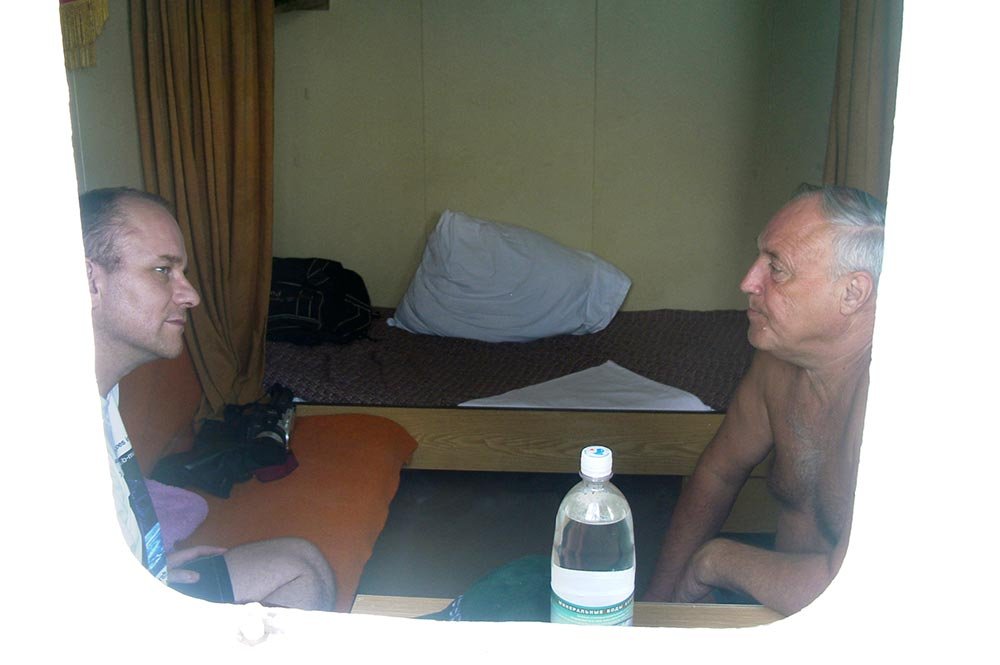 With Rostislav Bogdashevski, Space Psychologist - SB36 - September 2001
With Rostislav Bogdashevski, Space Psychologist - SB36 - September 2001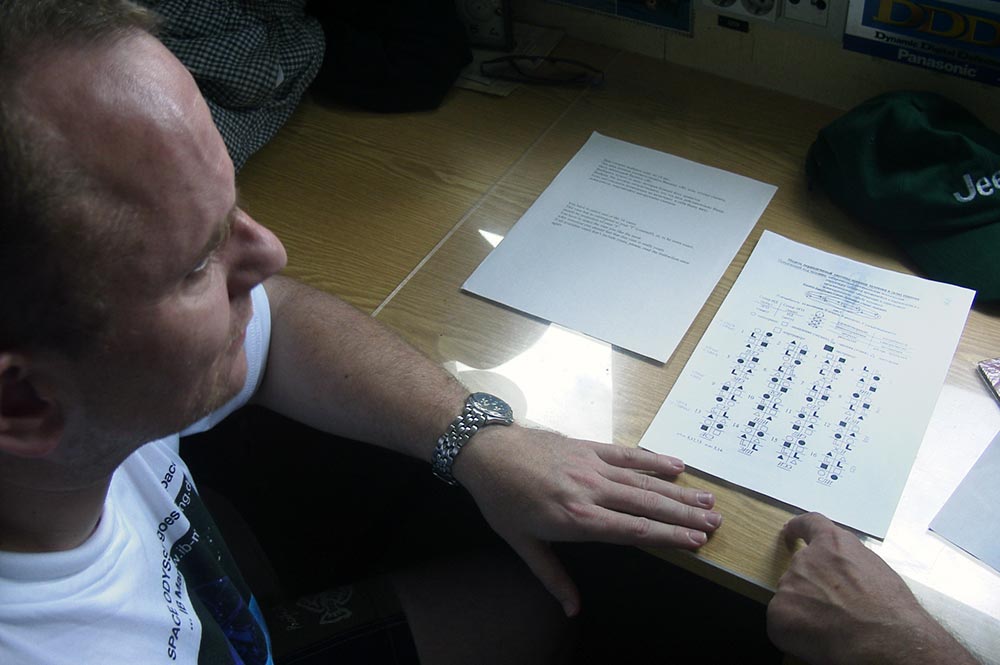 Space Psychology - SB36 - September 2001
Space Psychology - SB36 - September 2001Igor translates everything literally, and I learn what a cosmonaut must be for a personality. Rostislav analyses me, and within an hour with various tests such as colour tests and reaction tests, I feel illuminated, but also somehow strengthened in my intention. For example, I have to prove on a stopwatch whether I can stop for 10, 30 or even 60 seconds without seeing the clock. Since I'm a very visual person, I can do this right away because I can imagine the ticking of the second hand on a dial. Then I should press 50, 30 and 20 KG with a particular measuring device, just out of feeling. Surprisingly, I manage all this with flying colours. I start not to wonder anymore about my abilities.
The conversation with Rostislav, the psychologist, brings me a lot. He strengthens me with his charisma, which he undoubtedly possesses. It seems to me as if I would understand him without understanding his language. The insight through the door to space psychology is fascinating for me.
Afterwards, Sascha shows me the most different suit articles, which a cosmonaut has in the capsule. Underwear, flight overall, sweater, and then I see the Sokol space suit for the first time (the Russians speak of a "Skaphander", I've heard that before). I've never seen him in real life before. Then follows the Forel survival suit, which is waterproof if you can put it on correctly. This trout suit has to be worn over all other garments if necessary.
While I try to remember the different things, it happens unexpectedly: The other crews finish their dry training faster than expected, and Valeri comes to me and puts his hand on my shoulder: "Andreas, you will now do the dry training!". My heart stops: He really means it!
So off to the doctor; I'm turned upside down for half an hour: Blood pressure, ECG while lying and sitting and while standing. Everything's okay, and 20 minutes later I sit with my instructor Sascha for the first time in the Soyuz Descent Capsule! Oh my God, it's tight here, I think. And here I should change completely etc.? Sascha doesn't speak a word of English, the hatch is open, and Igor translates his explanations into English. Gracious Lord, I got involved with something!
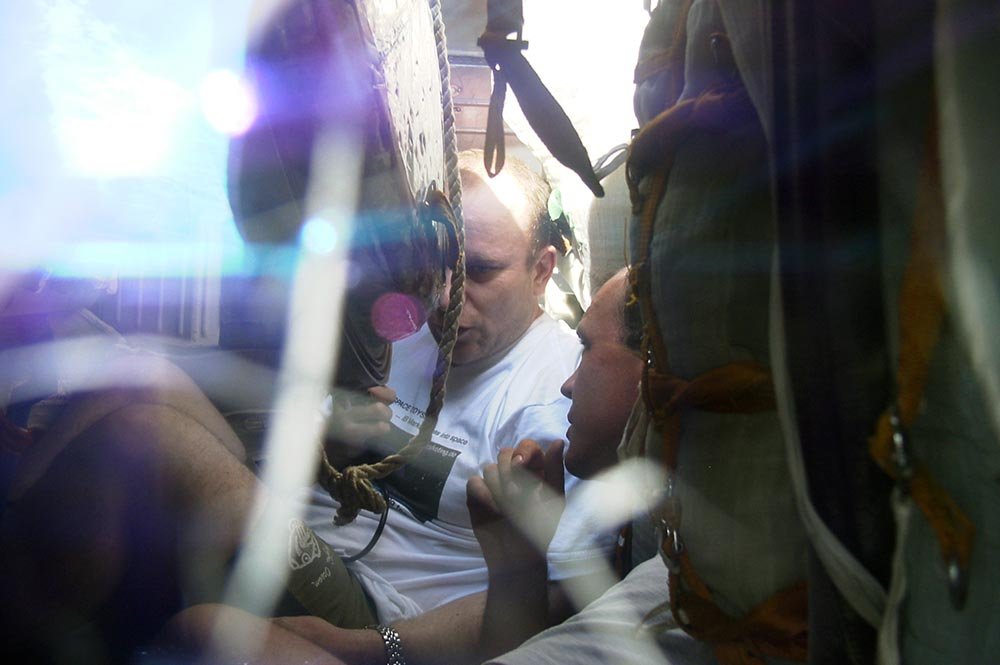 With Sascha in the Soyuz Descent Capsule - SB36 - September 2001
With Sascha in the Soyuz Descent Capsule - SB36 - September 2001Sascha explains to me what has to be considered when moving. In particular, one may come with any body parts to the switch of the primary energy supply and switches off the capsule. This is not critical, but the cooling is also switched off, and one should see that you can turn it back on as soon as you can. I'm not surprised, because even the way I'm sitting in the capsule, it's hot as a pig, and I'm wearing only shorts and a T-shirt. The sweat begins to run so already, that can be cheerful!
After 15 minutes of instructions, get back out of the capsule, and then it's time to put on the Sokol pressure suit, and that develops into a real ordeal. The instructors show me the best way to get the suit on; that alone is difficult enough.
I get dragged around on all sides, and it gets really exhausting. The sweat starts to pour, and because I don't manage to lift the top of the suit over my square skull right away, I get nervous. It seems as if hundreds of eyes are directed at me. Of course, many stand around me staring, but they instead give me the feeling of security.
After a few hurdles, it's done, and I'm standing in the cabin in full kit, in a Sokol suit. I'm told it's the biggest one there is, and it's also from earlier days.
Russian cosmonauts are a little stockier than their European and American counterparts. The maximum size must not exceed 1.84 m; well, I still have 4 centimetres good. But the suit is skin tight and doesn't give you much freedom of movement. Now I also understand the pictures of the cosmonauts on their way to their spaceship: A little bent like monkeys they walk along, and now I feel like an Australopithecus of prehistoric times!
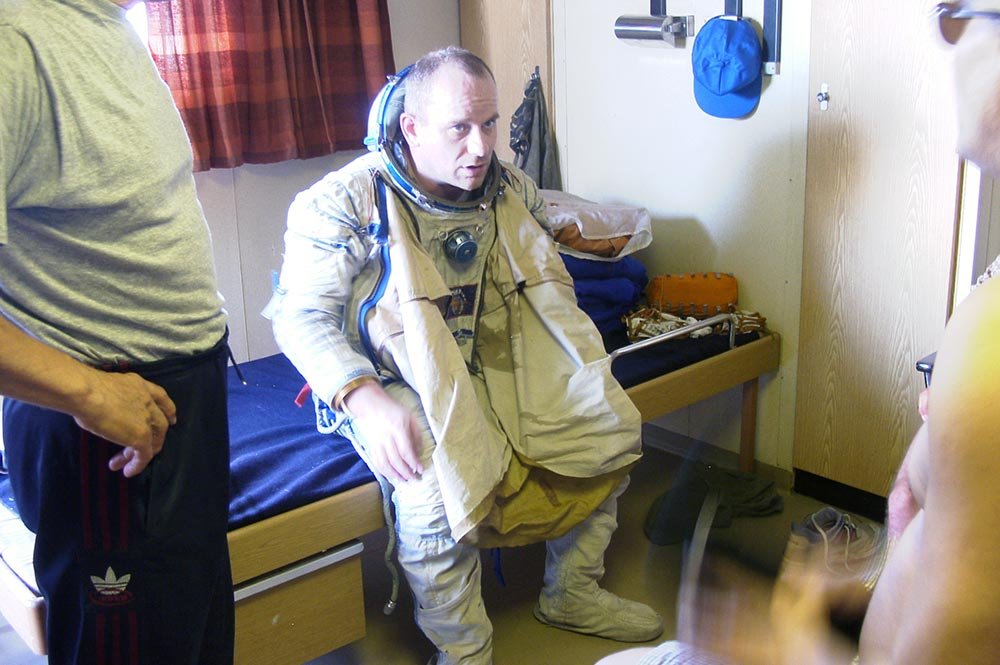 The torture with the Sokol suit - SB36 - September 2001
The torture with the Sokol suit - SB36 - September 2001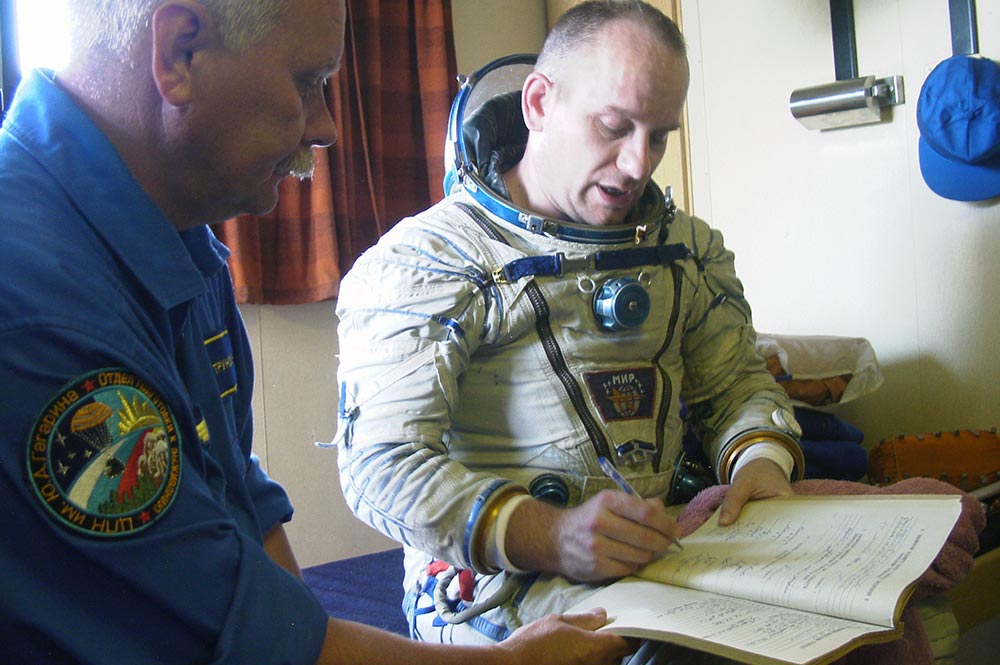 Sokol suited - signing acknowledge - SB36 - September 2001
Sokol suited - signing acknowledge - SB36 - September 2001Now I'm wearing a Russian Sokol suit for the first time, and for the first few minutes, it seems impossible for me to move correctly in it. He presses his shoulders quite well, and my feet slide back and forth in his own shoes. Then we make our way to the capsule, out of the cabin and down the ladder. I am flanked by men holding on to all kinds of loops and eyelets. I think: Andreas, don't worry. Nothing can happen to you!
Then up on the ladder, the view is very restricted by the folding visor of the helmet. But somehow it works then. I sit down on the edge of the Descent capsule, let my legs hang into the depth of the capsule and then slide into it.
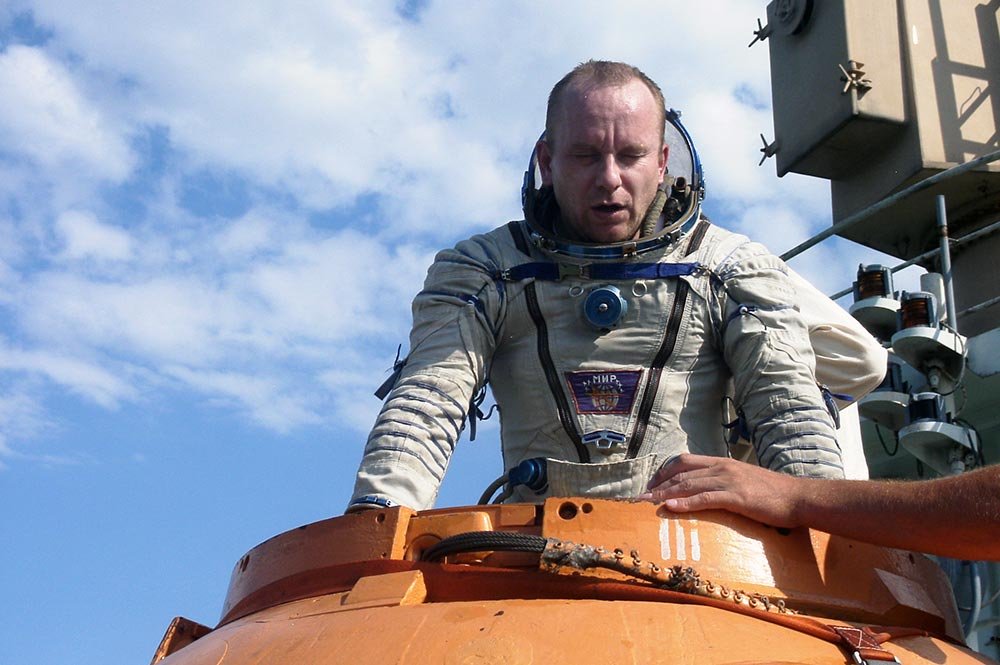 Getting in Soyuz - SB36 - September 2001
Getting in Soyuz - SB36 - September 2001On the right is my place, my God, in the space suit the capsule is even narrower!
I get stuck with the helmet in the hatch, but I turn the shoulder a little to the right, then it goes. My heart starts pounding, and I feel that I am already wet with sweat.
Then I sit in my right seat in the capsule and try to breathe calmly. In the rest lies the strength, I tell myself, nothing can happen to you. I haven't heard any horror stories yet, so I feel safe.
I try to turn my head to the right towards the porthole and see Rostislav with his broad grin. He stretches his thumb upwards, and I do it the same way, even if I am not one hundred per cent in tune with my thumb.
A minute later Sascha follows, and the hatch above me is closed. I feel like an aardvark in his burrow. Movement is not possible; only when I have pressed myself somewhat into the seat tube and bent my legs does it become somewhat comfortable. Slowly I get a feeling for what it means to be a cosmonaut!
After a short time, it really starts. Contact with the rescue team, our call sign is "Ozeana Dwa" (Ocean Two), the recovery team is called "Zarya" (sunrise). I am thinking of the Zarya module of the ISS.
The first step: "Skaphander out!”
Oh my God, the dressing was already tricky enough, and now the same in the other direction in this capsule. Sascha turns on the main power supply, and the ventilation is turned on. My heart starts pounding, but Sascha radiates a remarkable calm, and I think of Ed who told me: "Not in a hurry!“. Okay, Andreas, not in a hurry!
The removal of the Sokol is martial torture. The helmet part must be pulled over the head, and that is by far not easy! You have to push your neck towards your shoulders like a turtle and try to push your back straight through. At the same time, you press with both hands against the metal ring, where the helmet is adapted in one piece to the suit. To do this now in the capsule is not easy, and I am talking about a place which is probably not even 3 cubic meters big! After 5 minutes the aluminium ring slips over my skull, and the first sigh of relief from my side follows. Sascha grins. Yes, I think with me, you just smile. You're sitting there on your T-shirt, and I have to sweat one out here. But my thoughts aren't that negative.
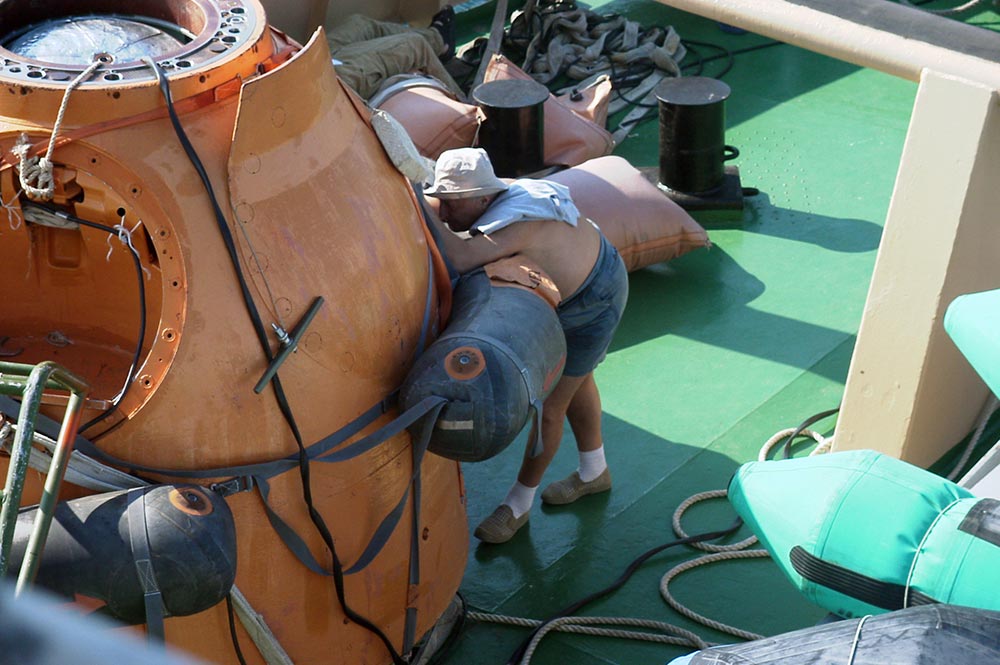 Under surveillance by Rostislav - SB36 - September 2001
Under surveillance by Rostislav - SB36 - September 2001After I've got rid of my Sokol, I'm shown how best to put it together and where to stow it. It is pressed into the seat tube, where it also seems to be best stored. Then the overall is put on. I feel like a little child whose diapers are changed. Sascha supports me, and then the overall is already pulled up to the hip. The temperature in the capsule rises and rises, I estimate it to be 50 degrees. But the most critical thing in the capsule: Keep calm. Step by step, and slowly take the next level, and above all do not overexert yourself. My pulse is racing, and the rescue team asks me on the radio how I'm doing: "Well, I think I've been better, but it's not that bad“. I report "All is okay" to the radio, and the dressing action continues now.
Now the cold protection suit follows. Also, the dressing becomes torture. I have to stretch and stretch. This is not easy for a man of my stature! After this is created, the wetness protection. Also, it is pulled up only up to the hips. Then follows the sweater and a wool cap.
Then the next hurdle: The water suit "Forel", a full body suit made of rubber. I take a short break, and Sascha gives me a hose from which cold air comes. It's not an air conditioner, but just a cooling tube that circulates existing air in the capsule and lets it flow out again after cleaning. This hose is usually connected to the Sokol while sitting in the capsule but thank God I am no longer wearing it. In between the rescue team asks about my pulse: Sascha gets a signal, and he starts measuring my pulse for 15 seconds. I estimate it at 140 to 150; I don't know precisely because I don't understand Russian. But it will work, I'm not on the verge of a physical breakdown yet. I just think that you usually make this move with 3 crew members at the same time, but that will probably go one after the other.
I pull the Forel over my legs up to my hip, then Sascha aligns the other things on me so that I can pick them one after the other over my shoulders. Oh, I feel more and more like a little child, the thing is very embarrassing to me. Sascha radiates a remarkable calm, and I let him infect me. I think again of my roommate Ed: "Not in a hurry! I put the different suits on my head, the heat becomes unbearable, a sauna is a blessing against it. At least you can move! But I don't feel bad, I've had worse times in my life. It's an incredible challenge for me, but it's hard to describe it if you haven't experienced it yourself.
The Survival Pack is leashed to my body by Sascha, then hood over my head and tighten. I feel like a penguin, even if the suit is called "Forel". But when I really think about it, the name of the suit is somehow clear to me: You can move in the water with the suit like a trout!
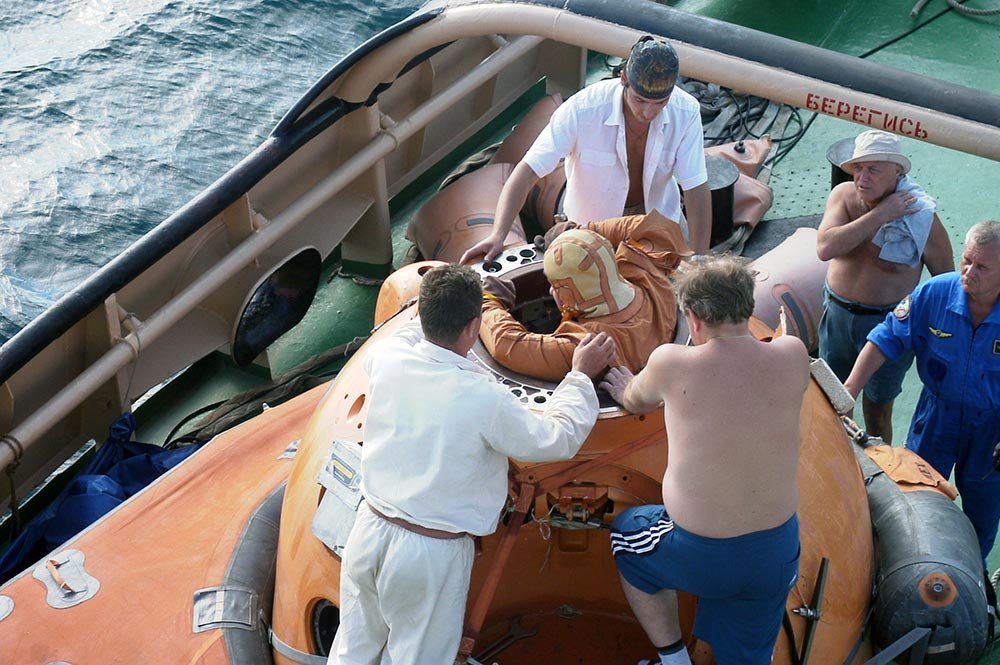 Getting out of Soyuz - SB36 - September 2001
Getting out of Soyuz - SB36 - September 2001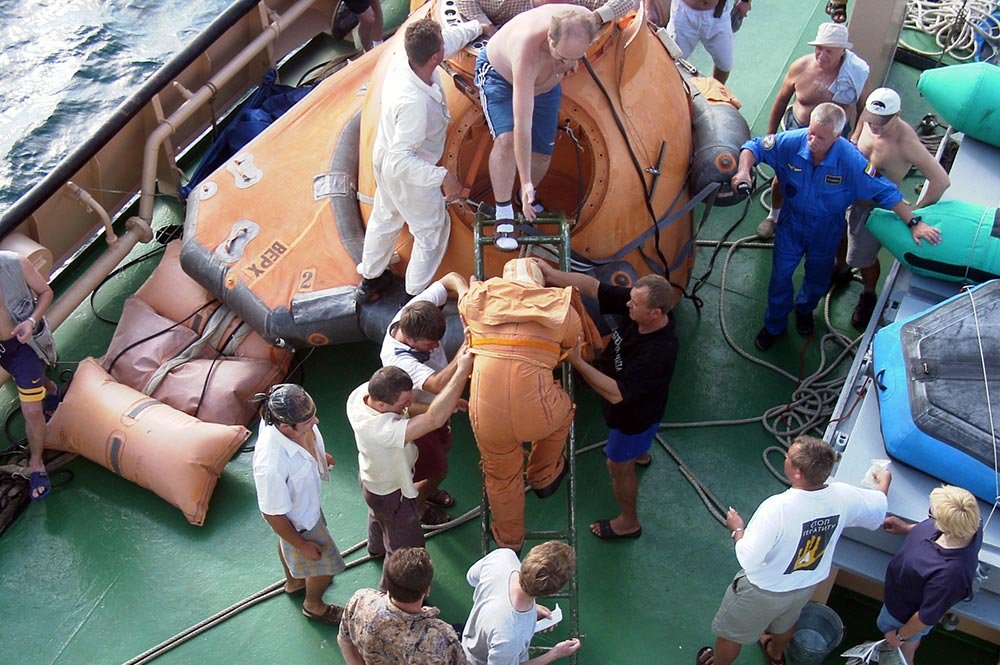 Getting out of Soyuz - SB36 - September 2001
Getting out of Soyuz - SB36 - September 2001Then Sascha opens the hatch above us, and I try to lift myself up. It works, and the sun burns in my eyes. But this is not a real problem; the movement with the different suits is not natural. 4 layers of different outfits are under the Forel, progress is almost impossible. I stay in the hatch for a few seconds and what follows is like a trance: I sit on the edge of the hatch of the capsule, try to lift my legs over the side. Somehow it works, and I stand. At a depth of 9 metres, I catch a glimpse of the surface of the Black Sea. Then I notice dozens of hands helping me. Just don't slip, and if you do, a helping hand is immediately on the spot. I crawl down the ladder the way I came.
Only when I stand on the deck of the ship in my suit do I notice that I am not only surrounded by helping hands of the salvage team: The entire crew is standing around me. Photographs are taken, and many friendly faces look at me. And the Americans first: They can't believe it!
Their displeasure with me as "Tourist" seems to have vanished, and they take pictures - we are not allowed to take photos of them. Now they seem to be over the moon, and the first face I notice after my ordeal is that of the American doctor, Rick. After sitting on a bench in my outfit, I see one of the doctors standing in front of me calling my name. I only have a short time to locate him, then I already have a bucket of ice water in my face. An ice bag is put on my head. Feels very good, oh - the earth has me again. Hmmm, the earth? I wasn't in space at all. Helping hands pull the previously put on clothes from my body, and the doctor pours ice water over me again. Shock therapy in perfection!
Here I notice the cordiality of the Russians in perfection. It is simply incredible. Much later, after a shower and a subsequent medical examination, I realise that I was sitting in a 3 cubic meter capsule, in which the temperature was about 60 degrees, with a humidity of 100 per cent!
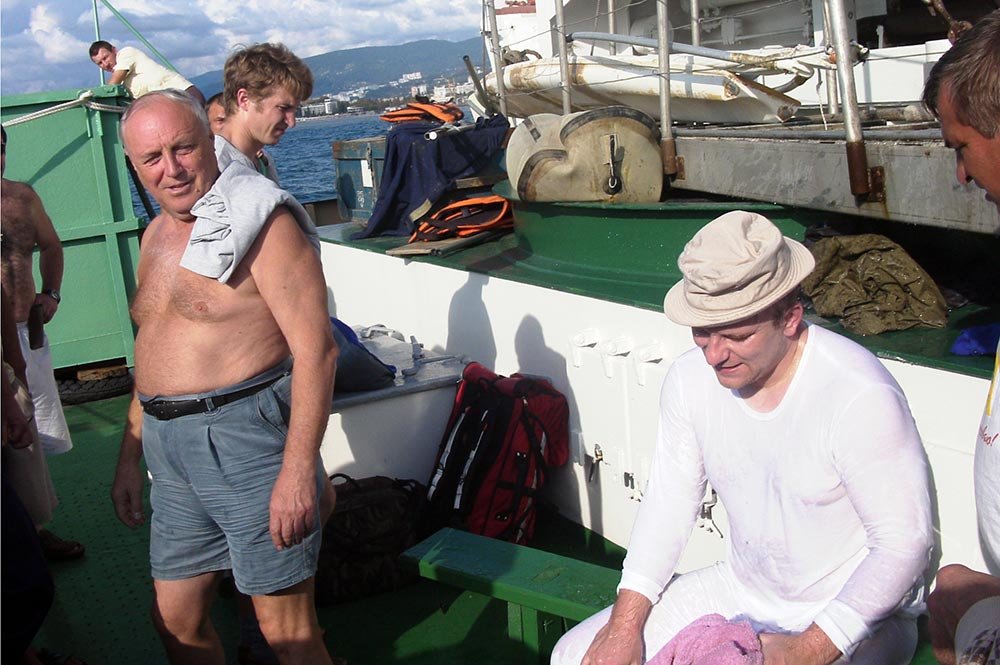 First step successful - SB36 - September 2001
First step successful - SB36 - September 2001Later Michael says: "That took an hour!“ For me it was days or minutes, I'm not so sure. I'm glad: not that I survived it, but that I finished the dry training. Without the energetic support of Sascha, this would have seemed impossible to me! I learn that Sascha was a MIG-29 fighter pilot before he was admitted to astronaut training. He went through 2 years of practice until he was found never to fly into space: He has a little illness at heart. Nothing special, but enough for him never to fly.
In the evening after 19.00 o'clock, we are again on land. After dinner a beer with Igor and Michael. Somehow, I notice that the people of the crew and the team have accepted me. That this is not easy is also clear to me, after all, they have never had to deal with someone who is not a professional. I learn that even Dennis Tito didn't do this training because he had "no time". Unbelievable. Between Igor and me is something extraordinary, perhaps the beginning of a beautiful friendship? Around 23.00 o'clock I fall into a deep sleep after writing my diary. The next day I should do the short training: At sea from the capsule into the sea with the Sokol. Well, if it is nothing else!
Floating membranes and other small things - 15.09.2001
9:30 a.m.
Back on the ship. Today I am supposed to do the short training, the exit from the floating capsule with the Sokol. My neck hurts, and I get a soothing massage from Rostislav.
Then Sascha will teach me again. I learn that for the next few days he will not only be my instructor, but also my commander. I won't train with real cosmonauts, this is quite clear to me, after all the boys have their flight and have to concentrate on other things than me, the "Space Baby".
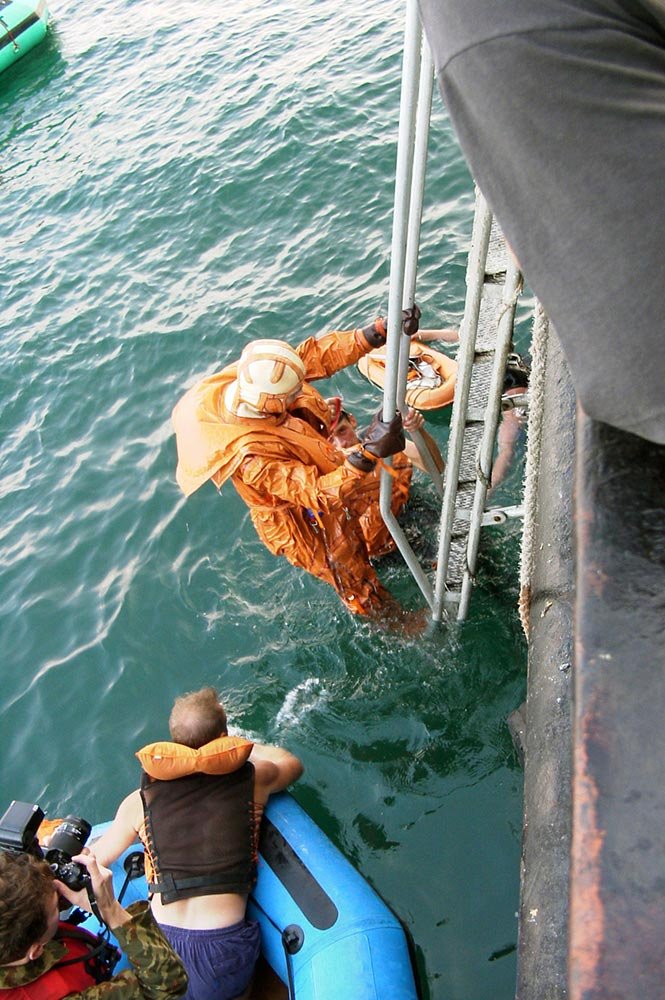 Alexander Volkov wearing the Forel Sea Survival Suit - SB36 - September 2001
Alexander Volkov wearing the Forel Sea Survival Suit - SB36 - September 2001Everybody has become more relaxed towards me since I proved yesterday that I can do what the professionals do. They shake my hand, take me in their arms and laugh a lot. They have accepted me as one of theirs, I think. The Americans, too, are no longer superficially friendly, but serious. Maybe you can't understand it. There comes such an IT business guy from Germany and does it after them. To think about it is quite funny.
Sascha shows me the handles you have to master when leaving the capsule. And hardly practised and discussed, the practice follows: I climb over the ship's ladder in the direction of the water and have to demonstrate the movements. Then over my shoulder to the left and right, move my hand to throw away the survival pack, pull the wire in the helmet so that the neck area of the suit pulls up against the neck and makes it tight, close the helmet a little. I keep my legs bent, do the hand movement with my free hand to grab the right floating device (this term will probably never go out of my head again, just like the terms "Descent Capsule" and the sentence "We must remind you!") and just let go of the step, do the movement away from my body with both arms (simulation for pulling the floating device) and fall backwards towards the water surface - dive into the Black Sea. Swash.
Only a few seconds later I reappear and get hints what I forgot or what I could do better. Sascha is in the water, a diver is around me, from the side of the ship from above I see Irina, who translates everything into English again, Igor and Michael, who films me during my activities.
Four times I do the "wet-dry exercise" until Sascha thinks I have mastered it to perfection.
Then follows the exercise in the "sharp" Floating Device. Everything works out, I fall into the water, the device inflates under my arms and brings me back to the surface! Uff, the second step towards "Survival Training" is done!
After lunch, I get the instruction to sleep. Only in three hours, it should come for me to the short training.
Unfortunately, it comes differently: Since different things have to be exchanged in the Descent Capsule, the whole process shifts. I get the message: For me, there is no more training today, because the professionals have to do their Long-Term-Training first. (Long Term means the same procedure I did the day before on the deck in the capsule, only on the water). Of course, I understand that, and I also think, because of the injuries on my body and my "stiff neck" it doesn't really seem wrong to me.
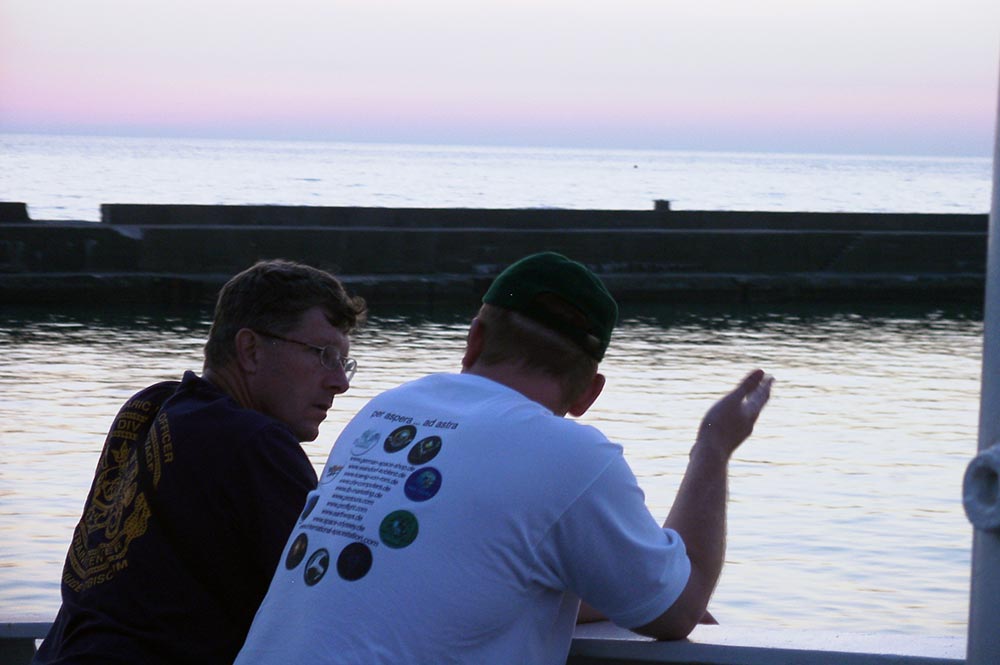 In a talk with NASA flight surgeon Rick - SB36 - September 2001
In a talk with NASA flight surgeon Rick - SB36 - September 2001Tomorrow I should do my "Long-Term-Training", directly at the very first crew (from this day on we are called Crew 3), - with Sascha together, he also in the Sokol and on the open sea! Well, a grace period, I think, and thus I am again in the ordinary course, as the professionals also.
So, I use the half day off to jump off the ship's wall with Igor and swim. I talk to him about all kinds of things and notice that we have been getting very close since yesterday, and this pleases me. We also go together to the ship's own sauna for two hours, which is quite good for my maltreated body.
Paul Richards and Sergey Volkow do not dive into the sea with the capsule until about 5 p.m., and I observe all activities as they emerge from the capsule again.
Oh my God, I think, - tomorrow it will be your turn. And I feel my bones quite well. But I know it will go well. Nothing can happen to me, and I think a strength in me! In the evening Ed says to me: "For God's sake take tablets for seasickness! Whether you need them or not, just take them. They don't harm you!”
Sea Sickness or not- this is the question! - A rebirth! - 16.09.2001
The fourth day in Russia. I feel like I've been here for weeks. After an extensive breakfast, we walk for the first time to the beach where the shuttle boat picks us up. The sea is calm, and today it is the first time; the last days we went by bus to Sochi harbour, where the ship was at the quay. After half an hour we take the shuttle boat to SB-36.
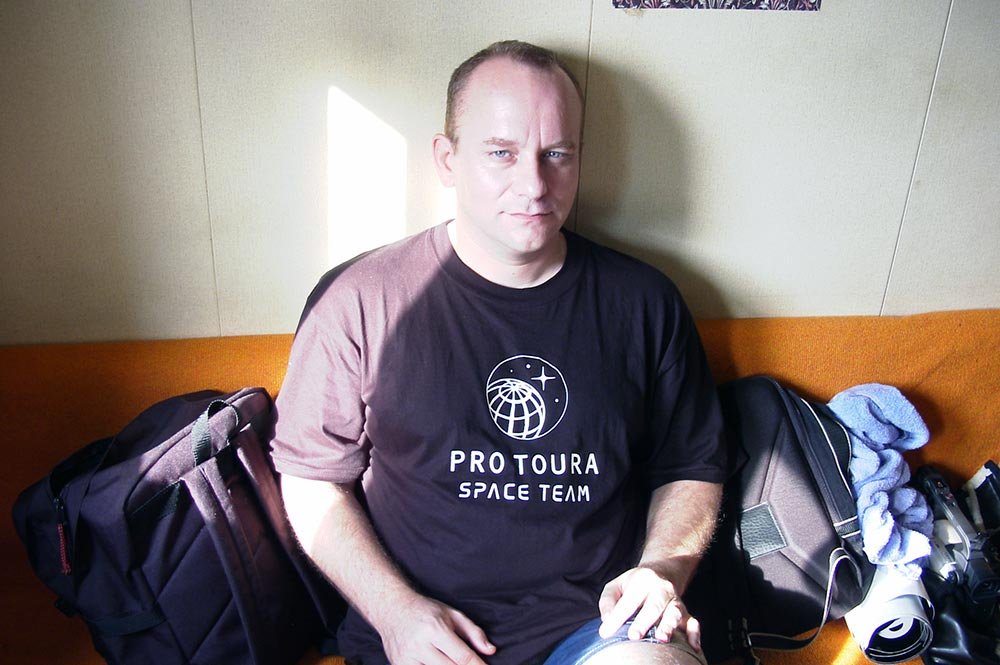 Waiting on the call for training - SB36 - September 2001
Waiting on the call for training - SB36 - September 2001With my instructor Sascha, who is not only my commander, but meanwhile a good friend (I call him my father, my mother, my sister, my brother - because he helped me incredibly in my situations on the days before!) we form the 3rd crew, which should complete the Long-Term training this morning.
After the morning medical check-up, the waiting begins until I receive my underwear for the Sokol spacesuit again. First Sascha and I talk briefly in my cabin, then we go into the changing room, and I put on the Sokol. Today it's much easier for me because I know how to handle it. The instructor is very satisfied with the way the Sokol is put on. With time you get a knack for such skills. Especially pulling the thing over your head is more natural than the first time, even though I have become 3 centimetres smaller since then, it seems.
After a good 20 minutes, we are ready. I feel good, but I sweat a lot, the day is sweltering. 10 minutes later I sit with Sascha in the Descent Capsule, and after a short time, we notice that we leave the mother ship employing the ship's crane. The capsule is gently released into the water, but then it hangs crooked in the water, which I could observe on the previous days. It hangs crooked in the water on my side, and I see as I look through the window that it is there under water. This does not frighten me, it is a spaceship!
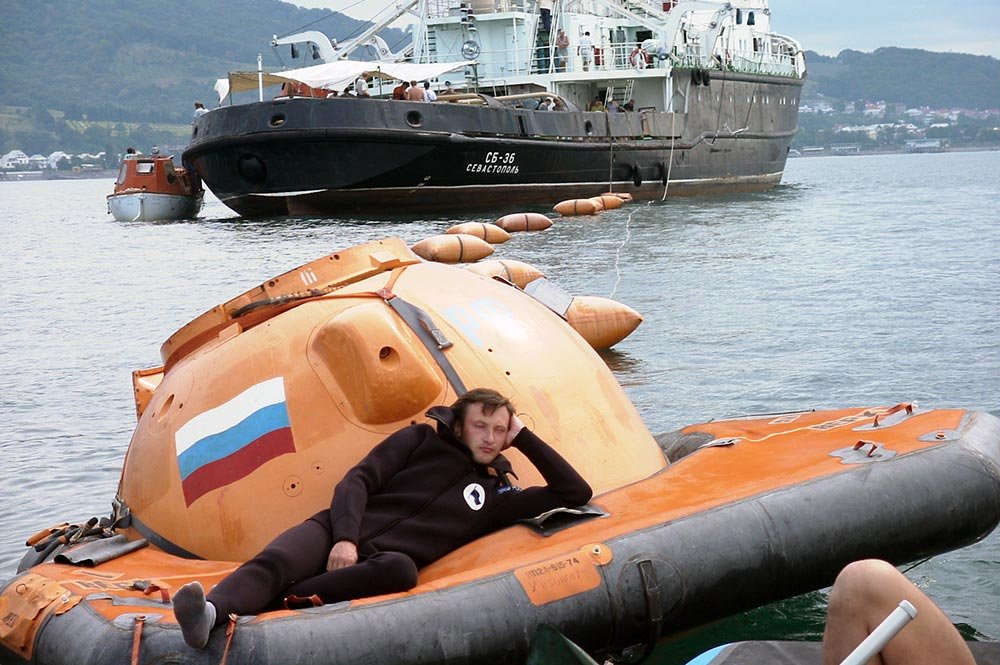 A rescue diver doing a nap - SB36 - September 2001
A rescue diver doing a nap - SB36 - September 2001There is a radio check, and then we are pulled 150 meters away from the ship by rubber dinghies.
Then the waiting begins! We don't know when the recovery team's order will come to take off our suits and squeeze us into others.
It's getting hotter in the capsule. We remove the supply hoses from the Sokol to get fresh air in our faces.
We go through the procedure again, and at some point, the order from Valeri comes in Russian: Prepare to leave the capsule. The stress can begin, the removal of the Sokol in the confinement of the capsule, now for the second time for me. But it's also more comfortable - like putting on the suit in the morning! Practice makes perfect!
But it's not easy because the sweat welds the inner rubber skin of the suit to my skin like super glue. After 10 minutes the suit is off, and we take a little break. Again, it is stowed in the tub seats so that you can sit on it. I notice that my pulse rate increases, but not as much as during the dry training two days before.
Then I put on the flight dress. This is a kind of trouser suit, and it is pulled up to the hip. In contrast to the dry training on Friday (Oh my God!) everything is much more comfortable. I help Sascha wherever I can, he doesn't have to help me so much anymore; I think I got out of "baby age". Then the cold protection follows in the same way up to the hip; it is made of light fabrics, which in extreme cases will keep you very warm. In between, we take a break to recover and supply each other with air through the cooling hoses.
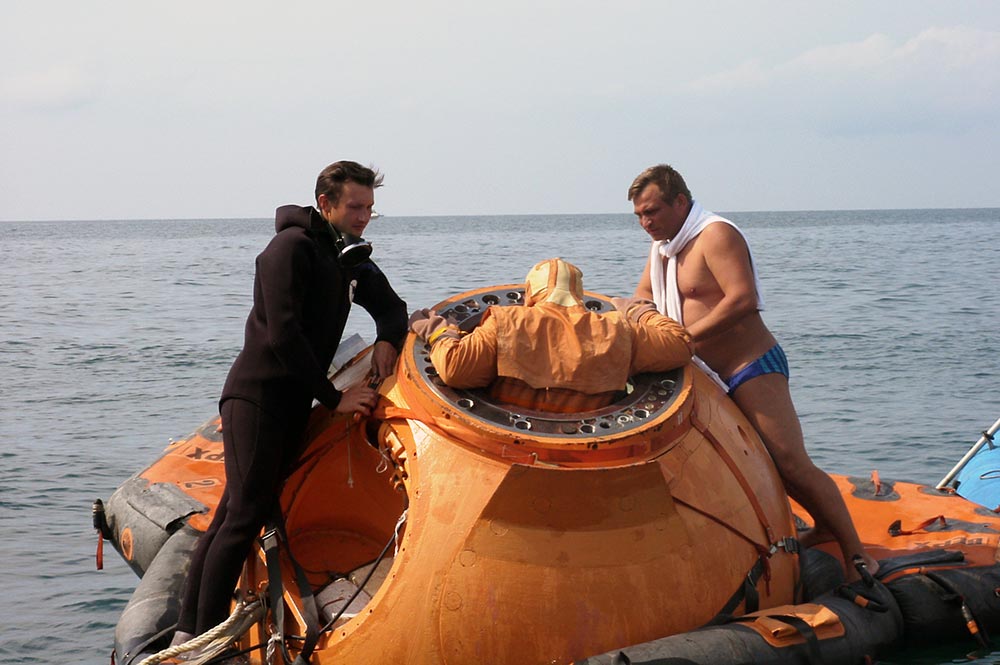 Escaping the Soyuz capsule - SB36 - September 2001
Escaping the Soyuz capsule - SB36 - September 2001"Take tablets against seasickness," says Ed Lou in my head, and when I think about it, I notice a "malaise" in my stomach. Oh, please don't. Not now and please not here! Sascha notices this and gives me the "vomit bag" for the emergency! Damn, why didn't I tell the docs this morning to provide me with something? Now I have a mess!
I try to breathe more slowly to get calmer, which I manage. The dull feeling in my stomach subsides, and I can go on. I hope I don't have to throw up. To be on the safe side I put my finger down my throat, but everything stays where it is. The capsule wobbles quite nicely on the waves, and the heat rises immeasurably.
After putting on the different suits (the stomach contents remain where they are, although it is not easy to keep them there!) follows my beloved Forel Suit. A second rubber skin, which then lies on the body like a "whole body condom" utilising a hood. It guarantees survival for 36 hours in 0 degrees cold water, but I already mentioned that! Then we put on the floating device, which we strap on each other. After the seat has been checked correctly, we hang our survival packs on a leash, precisely the same procedure as during dry training.
After the seat and the tightness have been checked, Sascha opens the hatch of the capsule; bright light floods into it. Then I get out, I have to get out first. I have to note that unfortunately I only found two left gloves in my kit, which already limits the movement of my hands a lot.
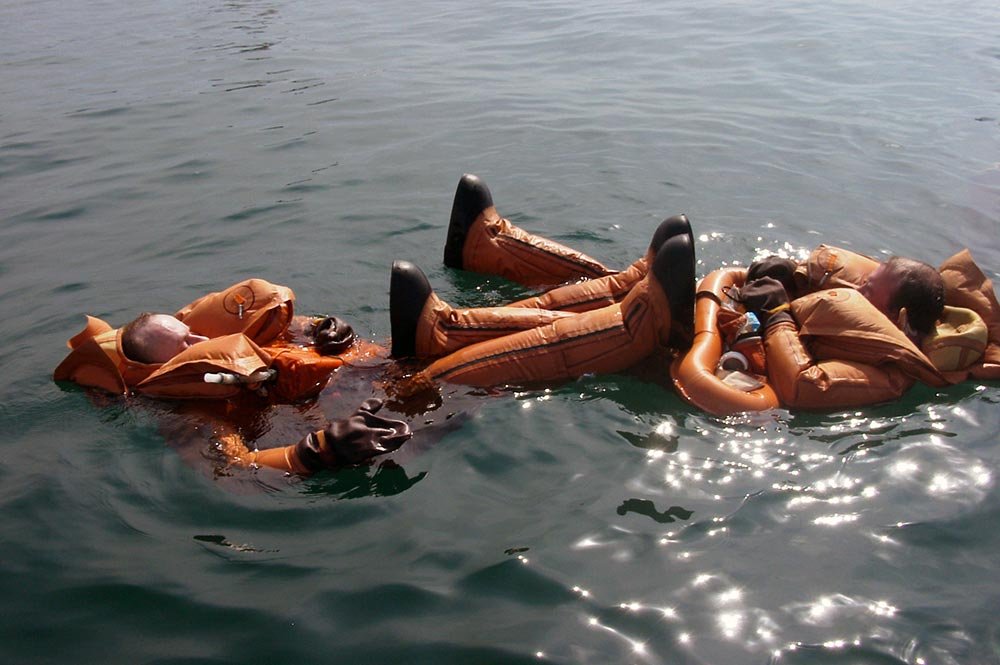 Floating on the Black Sea - SB36 - September 2001
Floating on the Black Sea - SB36 - September 2001I'm climbing up. Wow, fresh air that is also pleasantly cool surrounds me. I see three or four rubber dinghies around the capsule, and on the capsule, a doctor of the troop stands and asks me if everything is okay. There's usually only one doctor on the boats, two for me that day. No wonder. Sergey, the younger doctor laughs at me when I tell him that everything is okay with me. I feel the heat on my body, and I know: boy, another minute, and you're in the water!
I sit on the opening; the capsule is tilted back towards my back. I pull my Survival Kit out of the capsule, look over my right and left shoulder and throw the Survival Kit into the water. Then I get up, my knees bent, and hold on to the capsule with one hand.
Another 10 seconds, I think to myself, then you are in the water!
Then I just let go and fall backwards. I dive into the Black Sea. Uff, that's a blessing, and I feel like I've been reborn. That's how the feeling must be when you come into the world, I think for a few seconds, and when I lie flat on the water, I give a cry of joy from myself, no matter if it bothers anyone.
Uff, that's a relief. The heat is forgotten, my face gets a lot of water. It splashes next to me: Sascha has also left the capsule.
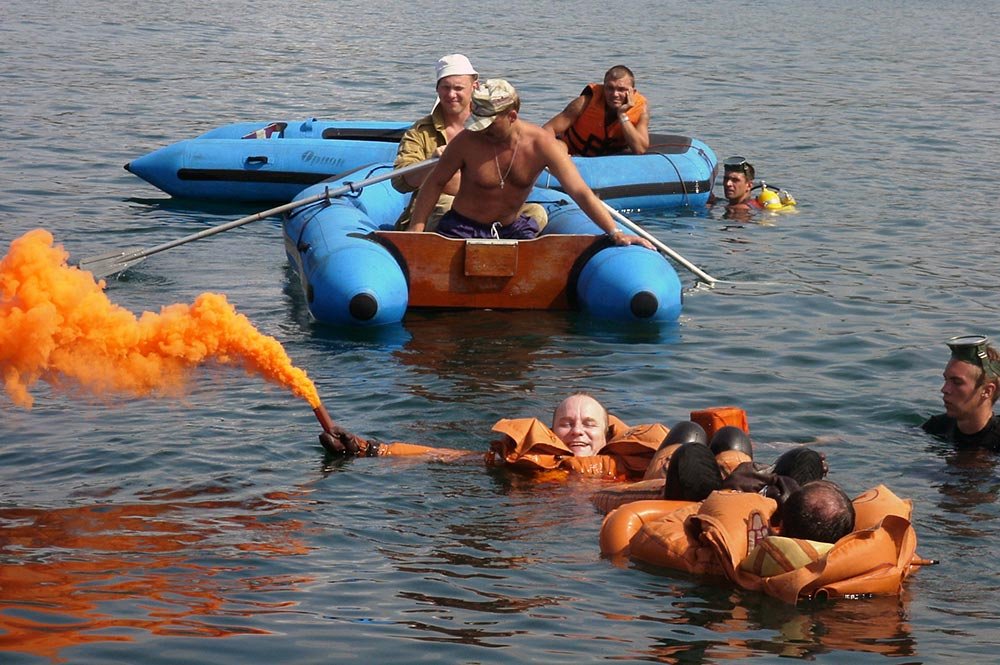 Giving smoke signals on the Black Sea - SB36 - September 2001
Giving smoke signals on the Black Sea - SB36 - September 2001I float surrounded by boats and divers on my back in the Black Sea and can hardly see anything because of the sun. I just feel great! Nevertheless, I don't forget what I'm doing here: I'm doing a survival course. So, I pull up my survival kit on the leash, it's the water supply.
I put the pack on my chest and wait until Sascha approaches me, and we lie opposite each other. Our legs entwine and we start working with the survival kits: We light the night and daylight, drink and eat. This is not as easy as you might imagine: You lie on the surface of the water and are rocked through. Water tastes like salt and so do the rations. But Space Chocolate in the Black Sea is something entirely new!
After we have eaten and drunk and used the Survival Kit, we form a row one behind the other and row with evenly distributed water.
Rudder movements towards life raft. Strong hands drag us around, and we are hoisted aboard. I have some difficulties getting out because my Forel suit wasn't quite tight. A few litres of water stand on both legs in my suit up to my knees! Good Lord, I think, good that this was just an exercise, in reality, I probably wouldn't have had a chance! The ascent up the ship's ladder is challenging, but after the exertions, it's still a piece of cake. Try walking in oversized rubber boots full of water!
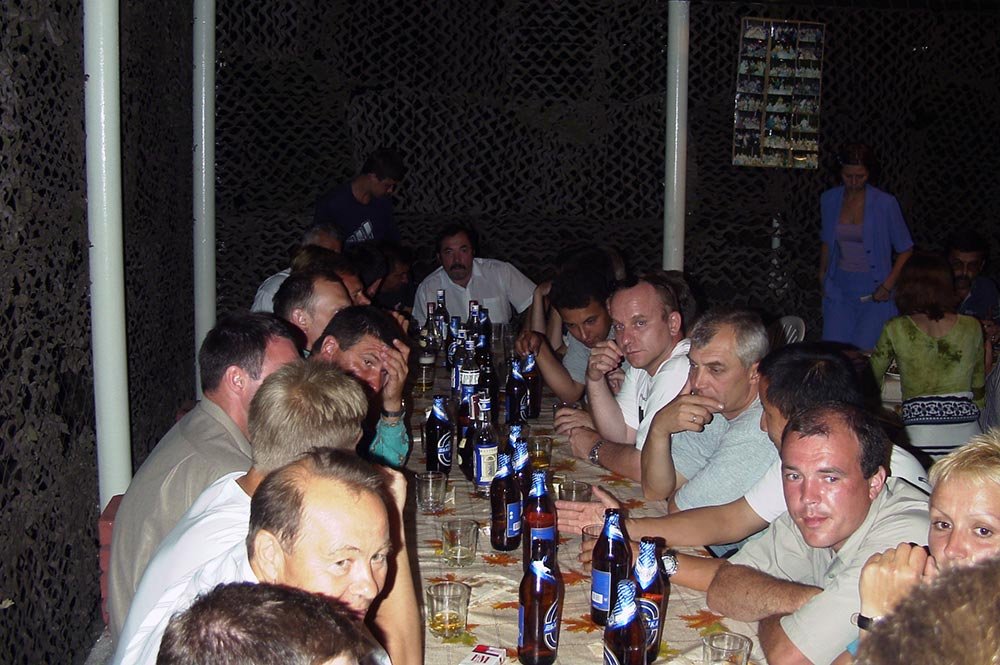 BBQ with Shashlik in Kudepsta - Sochi - September 2001
BBQ with Shashlik in Kudepsta - Sochi - September 2001I am greeted on board.
I realise that today I have become the first citizen of the earth to do Long-Term Training as a civilian and not a member of a space program. Hard to believe. It is difficult for me to process this thought in addition to the many impressions per second.
In the evening there is a long farewell party with all participants. We sit at a long table and eat shashlik, the best I have ever tasted in my life. I would love to drink more - Russian vodka is not as bad as the West claims. (You only have to drink a few glasses of water in between!).
I talk to Valeri for a long time. Well, he speaks perfect English, I thought to myself. We talk about training and other things, and I notice that he is proud of me. He never thought I would be able to do this training. It is a new experience for everyone involved, for the crew, the doctors, the astro- and cosmonauts, and above all for me. He says: Be proud of yourself. You did it, not us.
I indeed wouldn't have dared to do something like that, and now I've done it. I don't feel sad about that thought, admittedly.
Around half past one, I go into my room, smoke another one on the balcony and fall into a deep sleep afterwards.
Final training or "I´m sorry to leave Russia!" - 17.09.2001
Today is a special day for me. The last time on the SB-36. Just imagine once: A whole ship including crew and salvage team goes out to the Black Sea for me!
Igor, Michael and I have heavy loads to carry: 15 bottles of champagne for the crew want to be moved. It is not meant to be a farewell party, but a return party. In Russia, you never talk about the last time or the last flight!
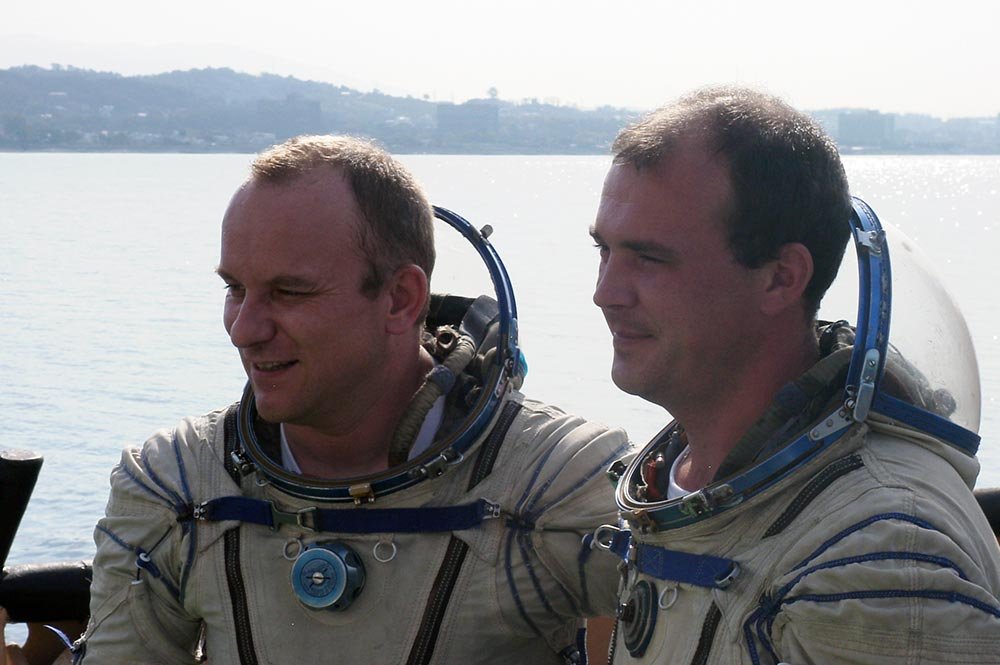 Posing before the Short-Term Training - SB36 - September 2001
Posing before the Short-Term Training - SB36 - September 2001At 9:00 a.m. we are in position, about 4 kilometres off the coast. Then the procedure begins for me, which I know from the past days: Medical check, change of underwear. Then I sit with Sascha in my cabin and rap shop. The particular thing for me is that he speaks very little English, but we still understand each other. Then it gets serious: Today I complete my final training, the so-called "short training".
The quick exit with the space suit Sokol is practised. I am told that the worst thing I would have drilled yesterday was in Long-Term Training. But still, I'm tense.
Then it starts: We go to the changing room to put on the Sokol. 15 minutes later the Sokol is perfectly laid out, and we take a photo with the banner of the sponsor "Photo Dose" from Bremen in front of the door of the changing room. Oh yes, on this day I feel like a model on the catwalk.
Then the boys take several photos of Sascha and me with the "Photo Dose Banner" in front of the Descent Capsule. I notice that the whole crew of the ship is present. I am happy: I am not excited, but a little tense. I feel as if I am flying to the moon or to the ISS. It seems to be a great day for me.
The first thing I do is climb up the ladder, and a minute later I'm sitting on the right seat. Sascha follows, and as he sits in the middle, he asks me: “Karachow?” I keep my thumb up. I notice how the sweat begins to flow again. But it is not unpleasant.
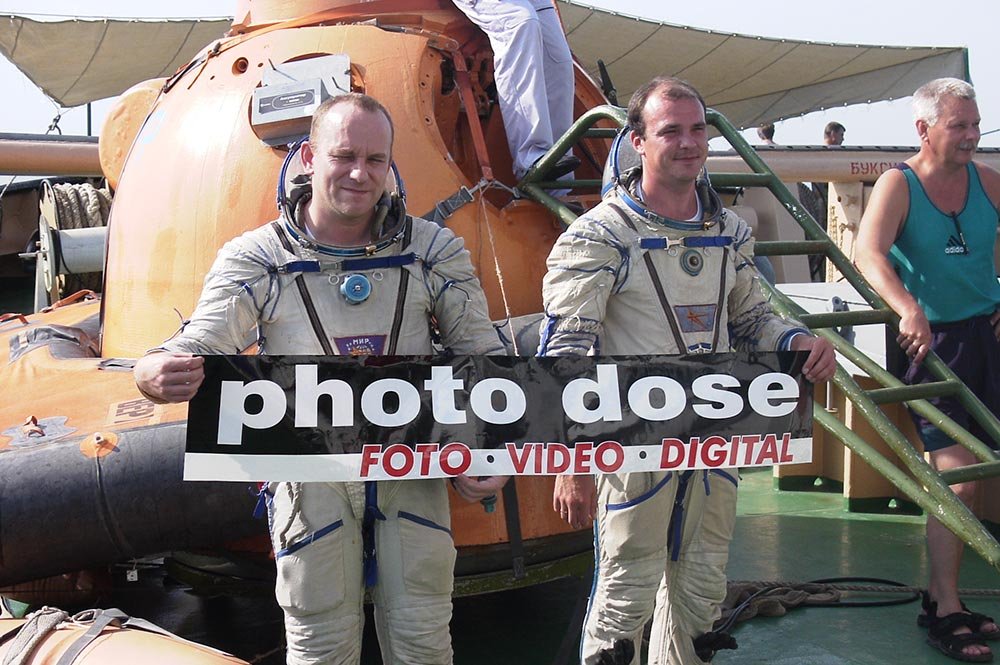 Posing for one of the sponsors - SB36 - September 2001
Posing for one of the sponsors - SB36 - September 2001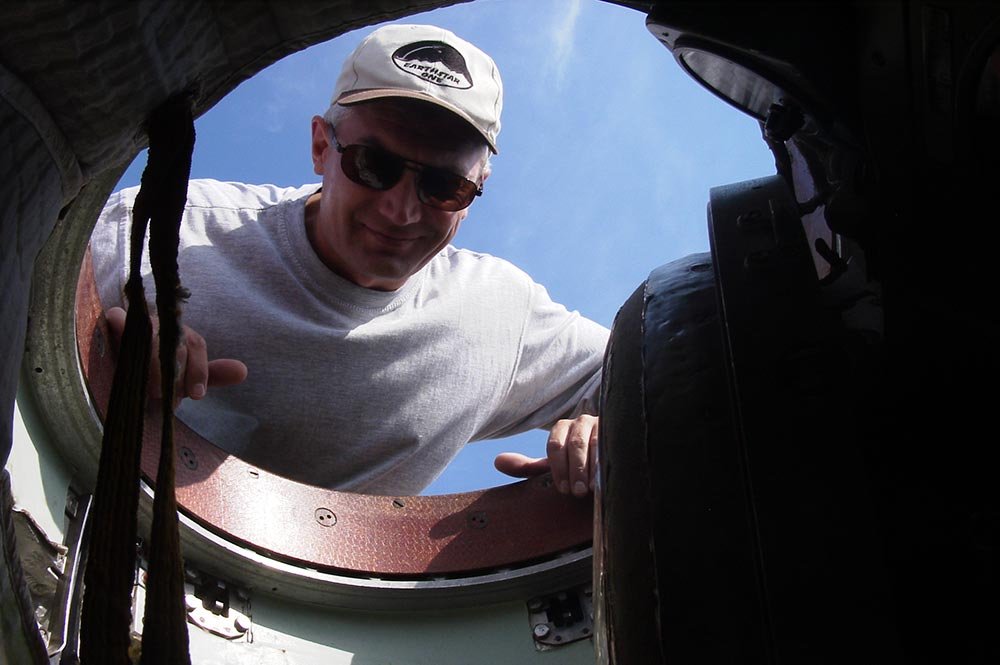 Igor looks into the capsule ‐ SB36 ‐ September 2001
Igor looks into the capsule ‐ SB36 ‐ September 2001One jerk and we notice the Descent Capsule being lifted up. A few minutes later we are in the water, the capsule tilts threateningly to my right again. I look right through the window still and see that it is under water.
20 minutes later we are on "open sea".
Now the waiting begins again. I rewind the last days and think about it. Sometimes I felt as if I was a delinquent on the way to the scaffold. We sit down more comfortably and relax. Utilising the air hoses, from which pleasant cooling air flows, we cool each other our faces.
I think of the cosmonauts who were in space. I think about Space not starting in an area, but here on Earth. That was already clear to me before, but not quite so consciously. The last days have changed my thinking a little bit.
After 50 minutes comes the order from Valeri: "Emergency escape!", and we set up our floating devices. I am now mastering this as well; every move is perfect.
Three times have done, always done, I think.
We prepare our survival kits and tie them up with our suits.
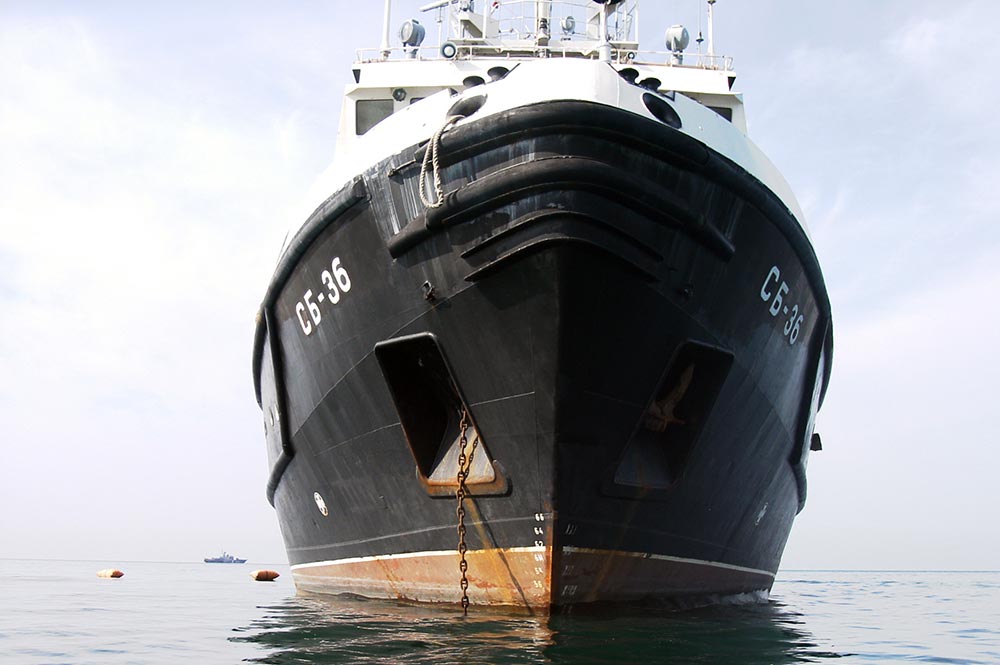 The SB-36 is anchoring - SB36 - September 2001
The SB-36 is anchoring - SB36 - September 2001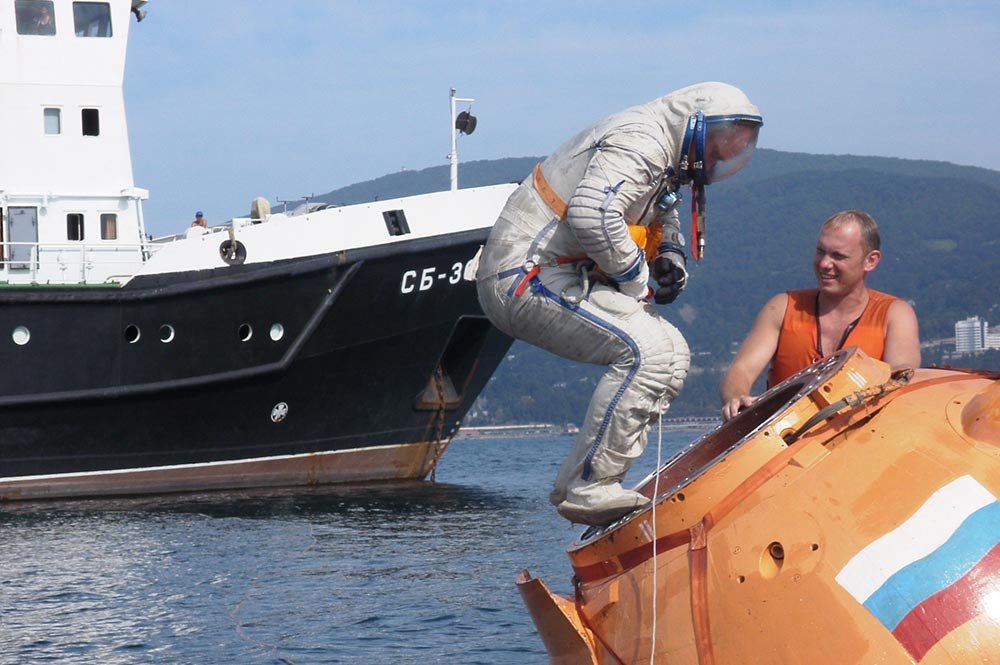 Trained often as once - the backflip - SB36 - September 2001
Trained often as once - the backflip - SB36 - September 20015 minutes later the hatch is opened by Sascha, and I go out first like the days before. It is not easy to get out of the capsule with the Sokol, but I already know the tricks from the previous pieces of training how to turn around to get outside without any problems. The sun is burning, and I see friendly and familiar faces as I come up through the capsule hatch. Now the practised procedure: Sit down, pull your personal survival kit out of the capsule, look left and right over your shoulder.
I throw the survival kit right into the water.
Then I get up and hold on to the upper edge of the hatch. Below I can see Sascha following me in the capsule. Close the helmet, right hand to the floating device on the right, with my eyes I fix the left one and let go: I fall back into the water and pull with both arms at the floating device when I feel that I hit the water surface. I dive into the water, the buoyancy aids left, and right are inflated under my arms like two days before when I did this exercise from the ship's ladder. Seconds later I am back at the surface and see Sascha leaving the capsule right after me.
On one of the boats is Igor, who takes a picture of me. I think I have never been photographed so many times in my life as in the last days! Everywhere cameras that are pointed at me.
Then we start with exercises in the water; the light signals for day and night are ignited. We hold on to each other with our feet. We continue to film and photograph!
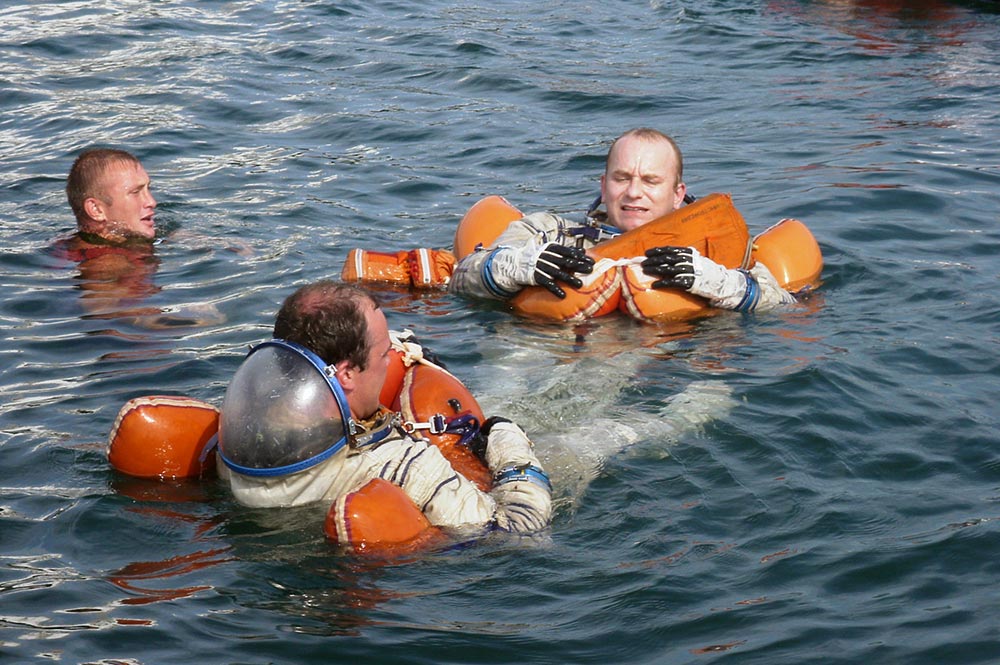 A 2-man floating life raft - SB36 - September 2001
A 2-man floating life raft - SB36 - September 2001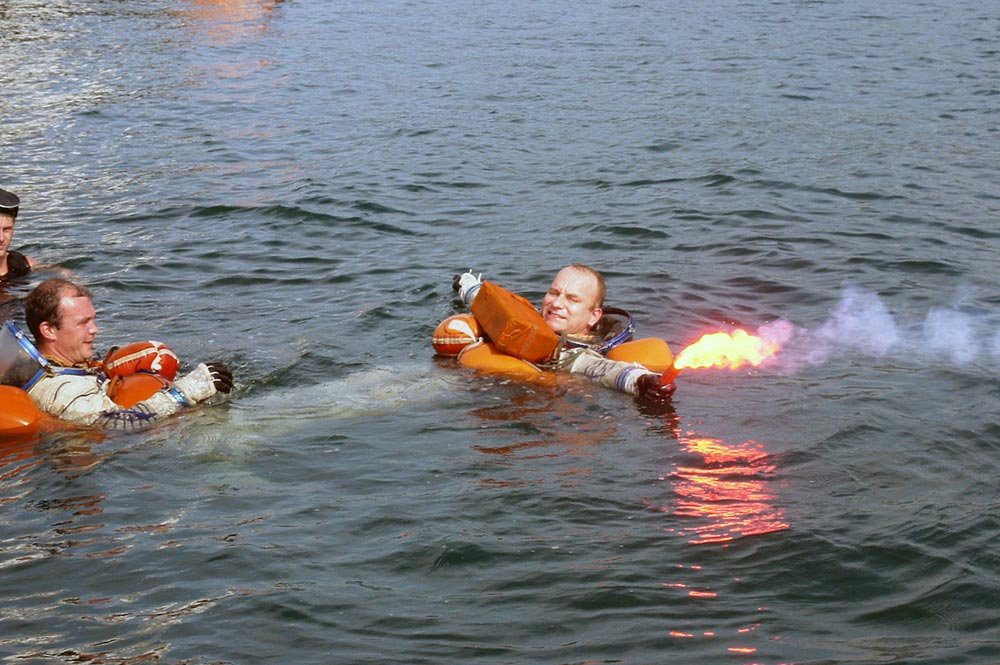 A 2-man floating life raft - SB36 - September 2001
A 2-man floating life raft - SB36 - September 2001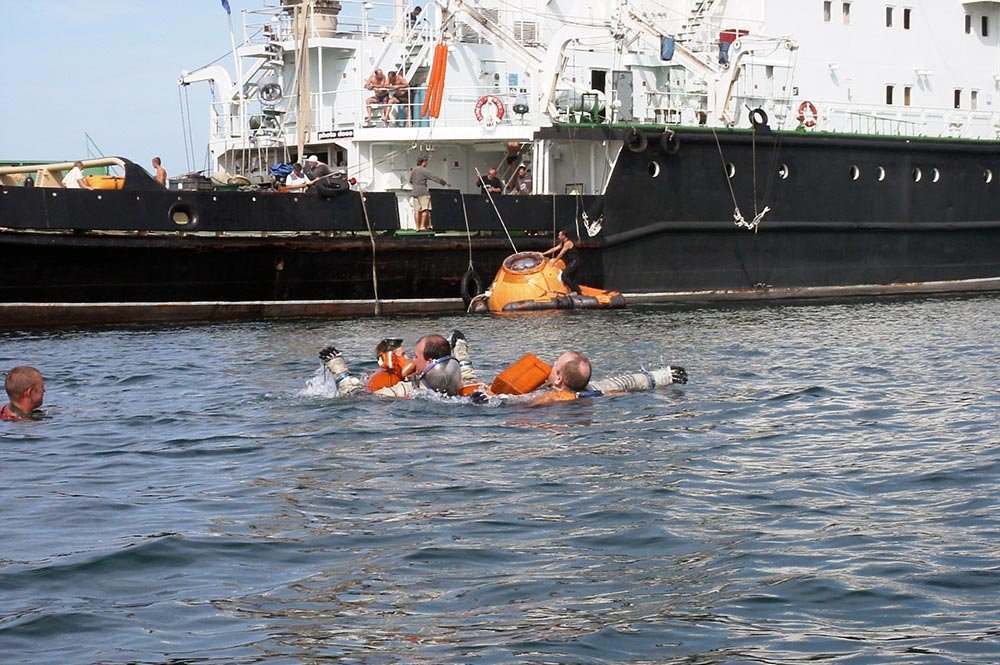 Approaching the life boat - SB36 - September 2001
Approaching the life boat - SB36 - September 2001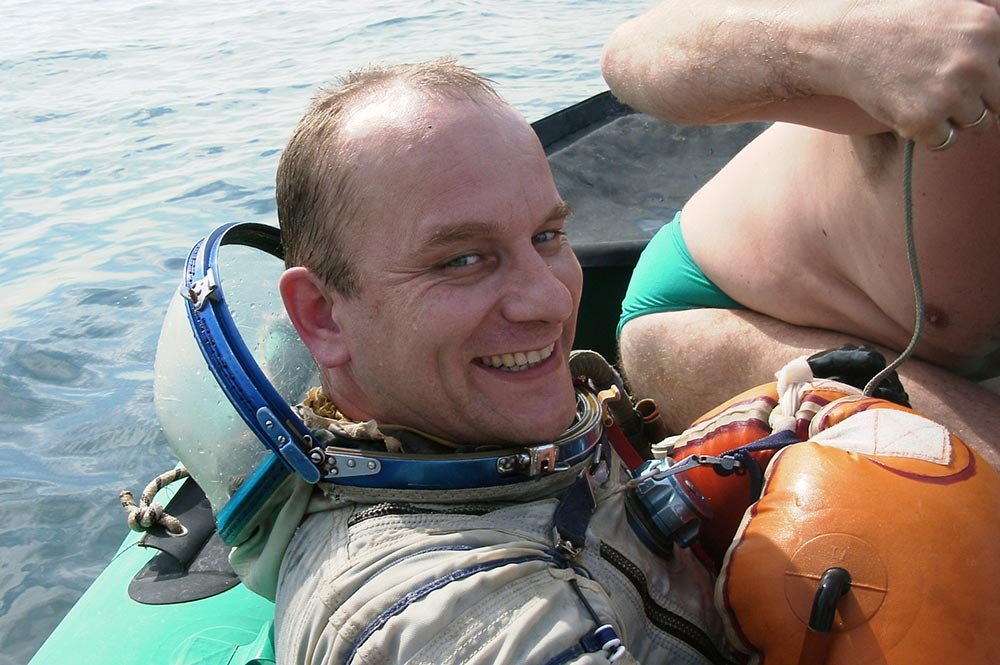 Rescue successful, and the training too - SB36 - September 2001
Rescue successful, and the training too - SB36 - September 2001Then we form another row at the end and row backwards evenly together to the lifeboat, on which we are then pulled. Me first, the rescue team pulls us back up, and we go back to the ship. I actually made it.And I did it myself. For me and with me together! Unimaginable!
On the ship I get applause. Everyone is standing there and wondering, or not. Now I have been the first civilian to go through the complete Water Survival Training: Dry training, long term training and short training. Tito didn't do it because he didn't have time, Shuttleworth only half, and me all. So, I know why Igor said, "First time to do that with a civilian."
Out of the Skaphander, into the shower. I am so proud of myself. Rostislav, the psychologist, says to me: "You made it.“ He knew it from the beginning.
After the shower I get a lot of visitors: Everyone congratulates me and shakes my hand. I learn that the whole ship is proud of me. There were already enough astronauts and cosmonauts who did severely, even those who lost consciousness in the confinement and heat of the capsule.
I think it's great that I'm experiencing this now, but it's the right thing to do: If I had been told that before, I would have entered with my knees wobbling. And later I also learn that there was an unfortunate accident when a cosmonaut drowned! Of course, they didn't tell me that before!
Then the final briefing with all instructors follows at the bow of the ship. They are delighted with me: It was an experience for everyone involved, even for the doctors: I am not a competitive athlete, skydiver or lone fighter.
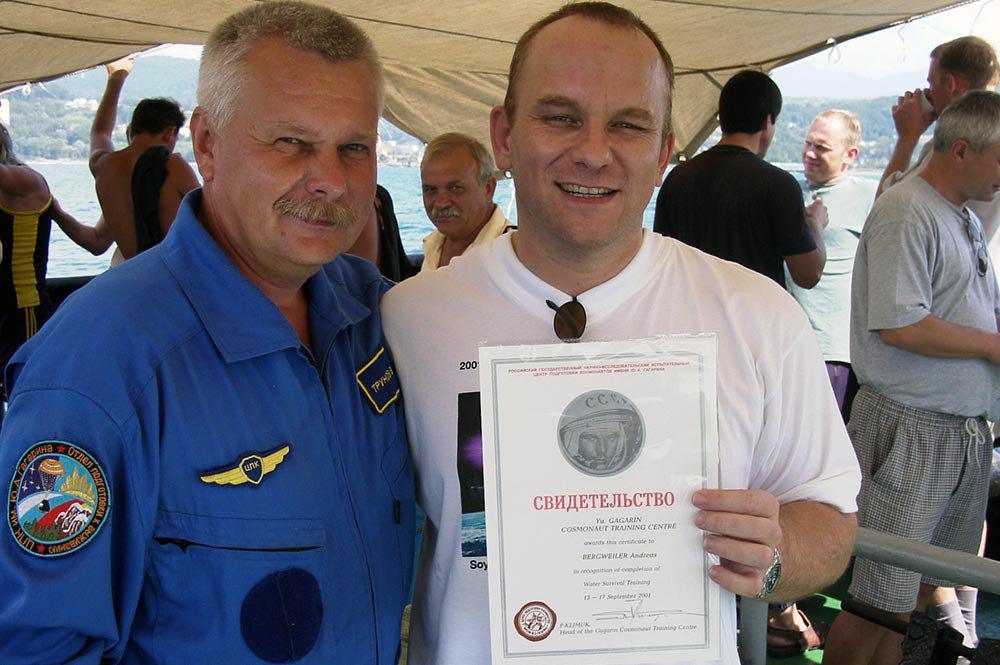 Valeri, Head of the training and the GCTC certificate - SB36
Valeri, Head of the training and the GCTC certificate - SB36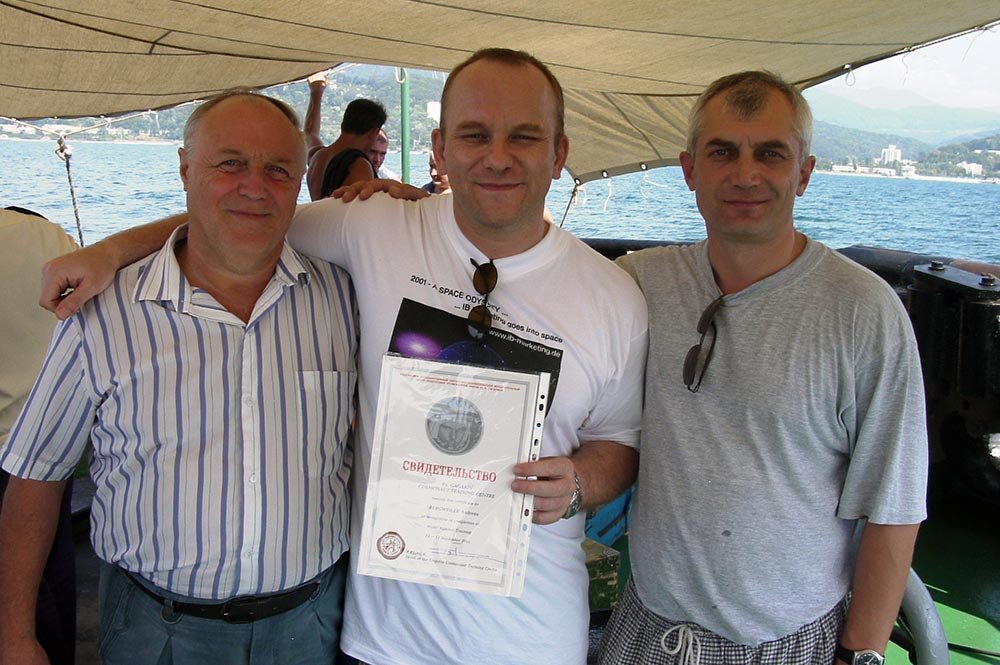 Rostislav Bogdashevsky, Igor and the certificate - SB36
Rostislav Bogdashevsky, Igor and the certificate - SB36After lunch reception for all crew members: I get a certificate - the first one the Juri Gagarin Cosmonaut Training Centre has ever issued for a civilian - for Water Survival Training. It says there that I get this honour for successfully passing the training.
I feel tears in my eyes as I receive the certificate and hold it in my hands. I address the crew with a little speech and thank them warmly: Without the team, all this would not have been possible. Above all, I learned one thing: self-sacrifice and self-sacrifice. Only in a team is all this possible, and now I at least know what exertions can come after a space flight!
Afterwards, we are given a special honour: We dine in the captain's cabin with the ship's bosses. I feel very honoured and am also very moved.
At 15.00 o'clock we leave the ship. I am agitated like seldom before when I see the ship disappear on the horizon. One must now introduce oneself: There is now a ship in the Black Sea, which carries large stickers from the primary sponsor "Photo Dose", and some crew members wear the T-shirts of my company...
There is still time for 2 hours: We celebrate Igor’s 44th birthday at the beach cafe in Sochi. He says to me: "This is the best birthday of my life!“ I look at him shamefacedly.
Sergey Volkov is also sitting at the table. I don't want to leave this country and the people! I also notice the quietest of the Russian cosmonauts, Yuri Ivanovich Malenchenko. He has also been in space twice: from 1 July to 4 November in 1994 he was commander of the MIR 16 mission and performed the first manual docking manoeuvre of a Progress transporter. He was also a Mission Specialist on the STS-106 from 8 to 20 September 2000 on board the Space Shuttle Atlantis, where preparations were made for the first crew of the ISS. Only now it becomes clear to me which people I am dealing with here! After two beers back to the hotel. Now it is time to pack, say goodbye to Kudepsta, at 19.00 o'clock Michael and I are to be picked up.
Valeri, the boss of the training team, says goodbye to me cordially, we exchange business cards. Igor goes with us to the airport, and we check in.
The worst thing for me is to leave Igor. Of course, the others too, of course, but Igor connects me more than just a few days here. I think at least today. What the future will bring, we will see.
Michael and I still have to wait 2 hours, then we fly back to Moscow with an Ilyushin 86. I'm tired, but on the other hand, I'm totally psyched. Many thoughts go around in my head, many faces appear and disappear again.
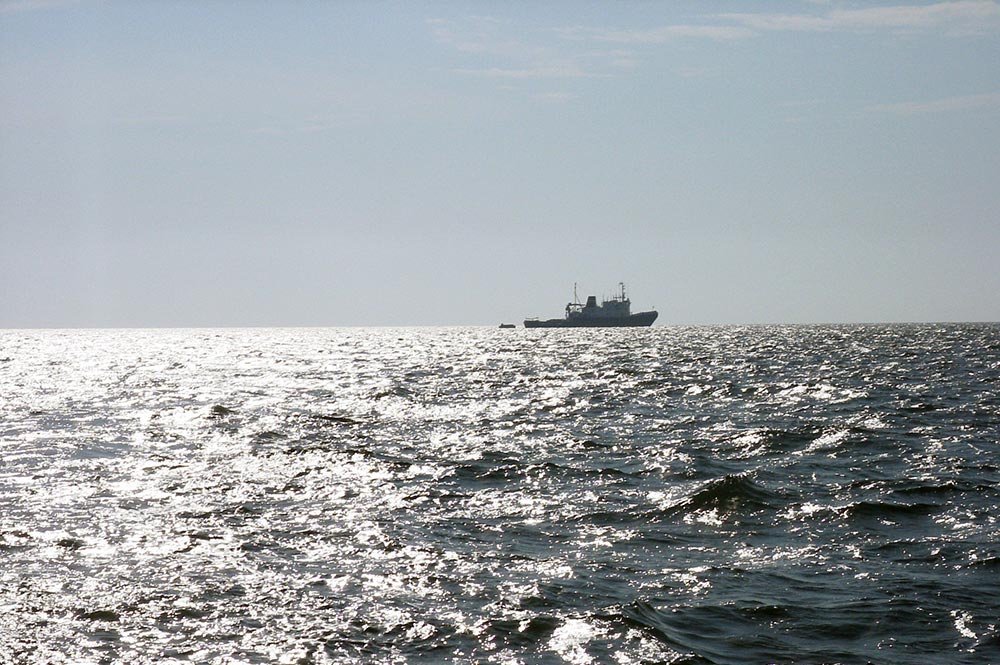 Dosbedanja, SB-36 - September 2001
Dosbedanja, SB-36 - September 2001A few weeks ago, I was still thinking about the journey, now I have it behind me, and I am flying towards my present. Somehow it seems to me that I am flying into another time. Let's see.
In Moscow, we are picked up as promised by an employee of Igor's and taken to the Renaissance hotel, a 5-star house. Hmm, you don't treat yourself to anything else, but I don't really feel comfortable in this pomp. I can hardly get used to the comfort here, in my thoughts I am still on the ship and with the crew, and above all: in the Descent Capsule!
I feel as if I had been there for 4 months. So many new impressions, something new every day, almost too many impressions! I switch on the TV set and see, channel 1 is RTL German. I choose it, and for the first time, I see pictures from New York that I hadn't seen before! Shit, I think, there was something!
I see again and again the pictures of the planes crashing into the twin towers, dust and ash clouds in the streets of Manhattan and people screaming running away to escape the chaos somewhere! A hatred for all this is developing in me! I get angry and could kick my foot on the television, but I control myself. Doesn't bring anything!
Sometime in the last days, I had called home, and Astrid told me something about "military mobilisation"! Ed and I sometimes watched Russian TV in the evening when there was time, but there wasn't much of it there. Ed said "Well, it seems that the Russians saying, that this all is the problem of the other nation!”
Although, if I think about it correctly, a very high Air Force general was picked up early in the morning sometime the days before when I was sitting on the balcony of my room in the Kudepsta training camp. Later it turned out that this same general was the commander of the Red Army Rocket Troop and that Moscow had been prepared for such an attack. Somehow. So, it didn't go past the Kremlin yet, and he was taken back from his summer vacation.
Around 2.30 a.m. on Tuesday morning I fall asleep ...
Dosbedanja, Russia - 18.09.2001
In the morning we do a short sightseeing tour of Moscow with Natalia (she is Lufthansa representative in Moscow): Metro in Moscow and to Red Square! I am overwhelmed!
Around 14.30 o'clock local time Michael and I sit in the plane and fly in direction home, where we land around 16.00 o'clock. And then: I´m back!
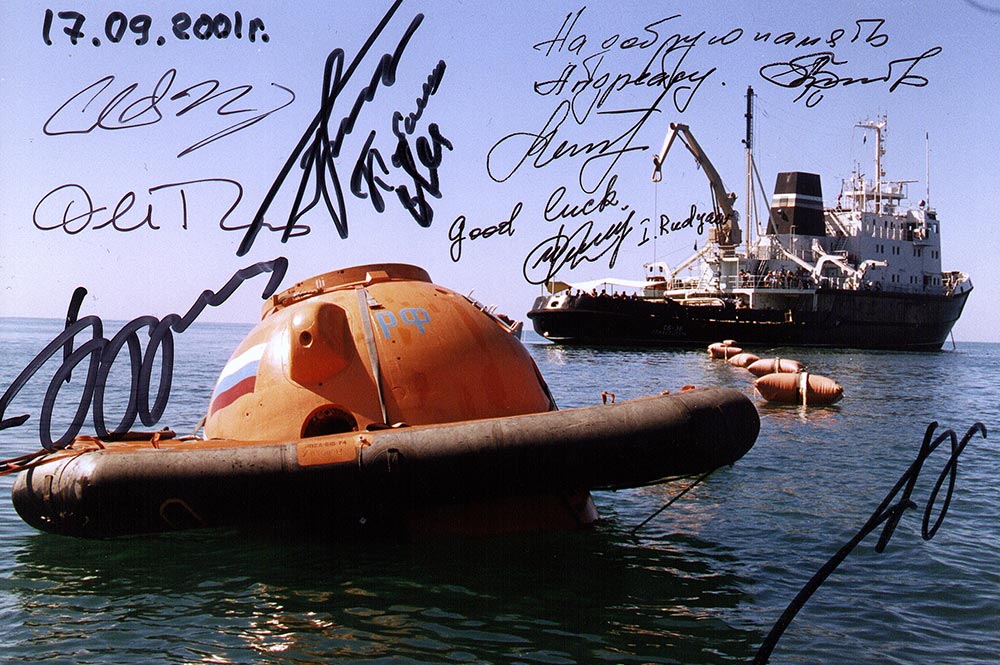 A greeting from the crew of the SB36
A greeting from the crew of the SB36I will definitely need a few days or even weeks to come to terms with these experiences of the last few days. It was like a "Rebirthing" for me!
As a wreck with thousands of thoughts to Russia, strengthened back. It was the hardest, most exhausting and best experience of my life.
Dosbedanja, Russia - Dosbedanja, Igor and Crew - Dosbedanja Descent Capsule!
I will not forget these days until the end of my life!
Epilogue
Who would have thought that something special would grow out of this story and that I would find one of my best friends in Igor? I still remember when my on-ship-training was postponed for one day that we talked about "space business" trivially in the Russian sauna, but that, I thought, was more because of fun. Wrong thought! We were both so wrong!
By Andreas P. Bergweiler (D) - Sea Survival Training - September 2001
Andreas P. Bergweiler
Sea Survival for Cosmonauts
September 2001

